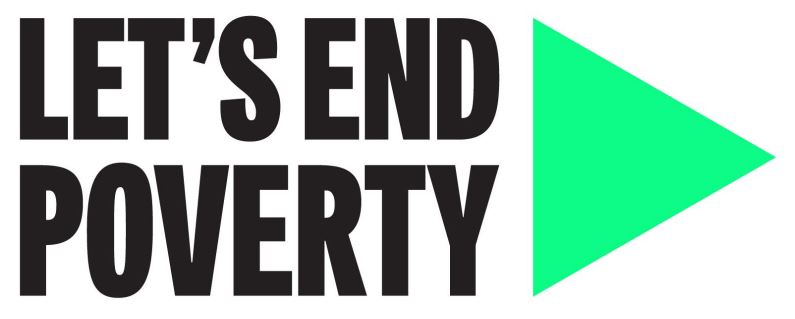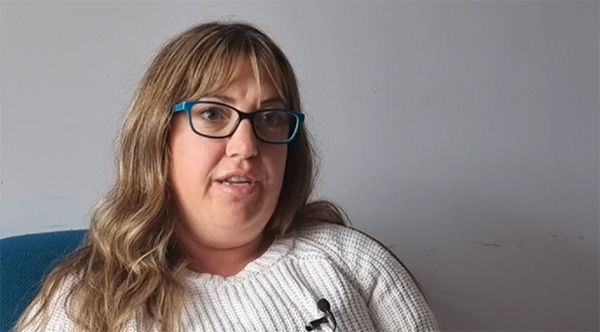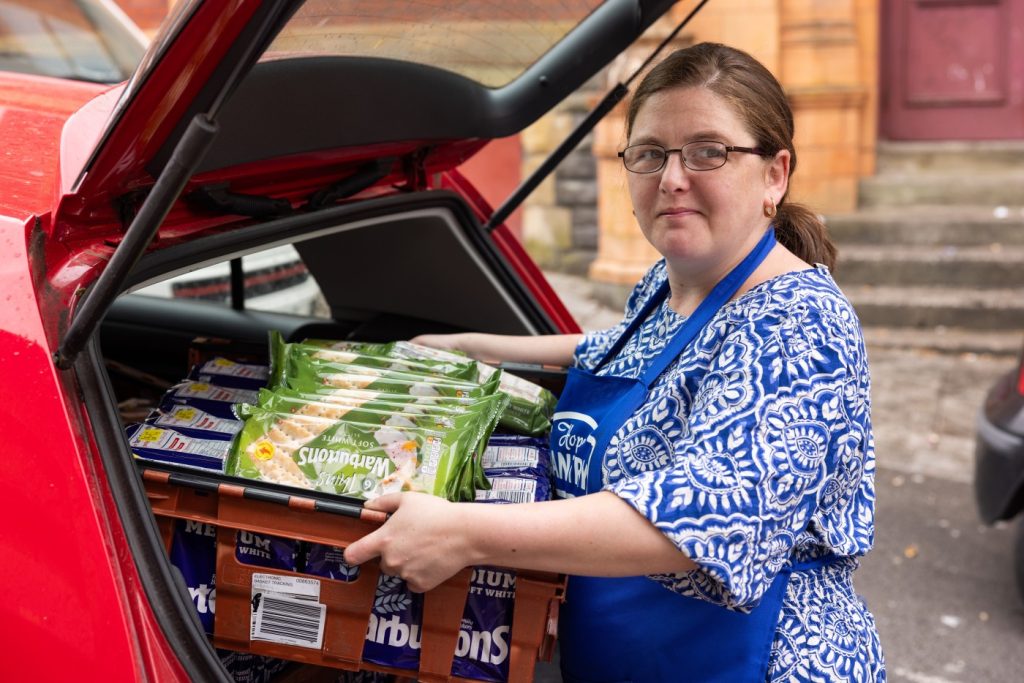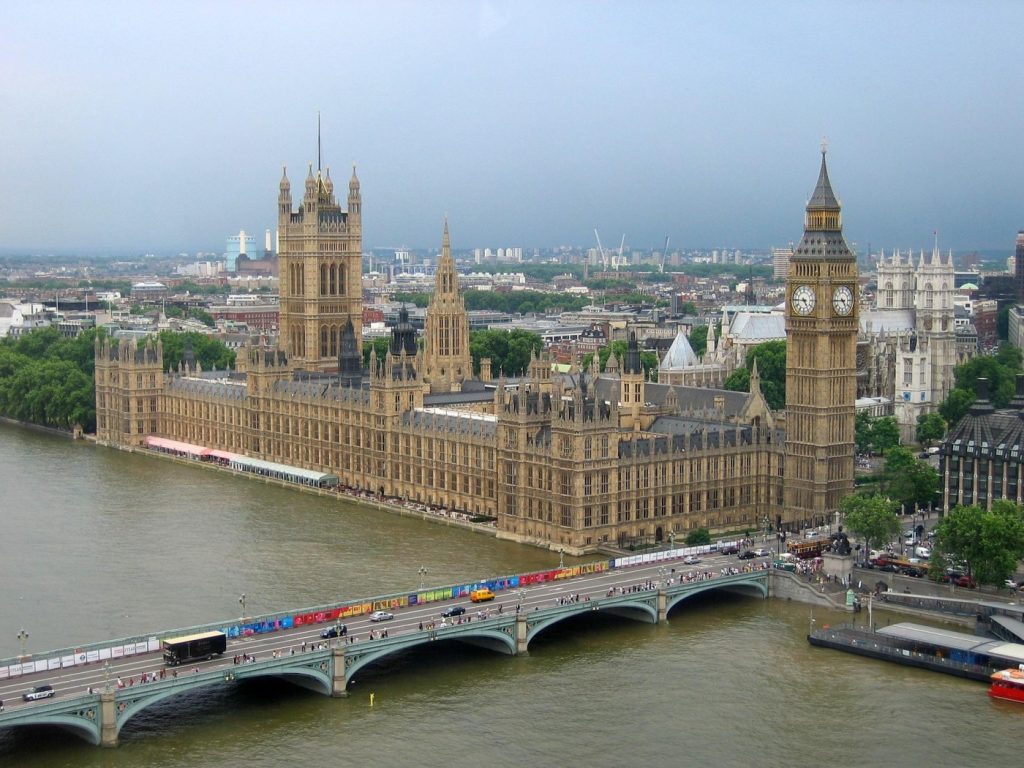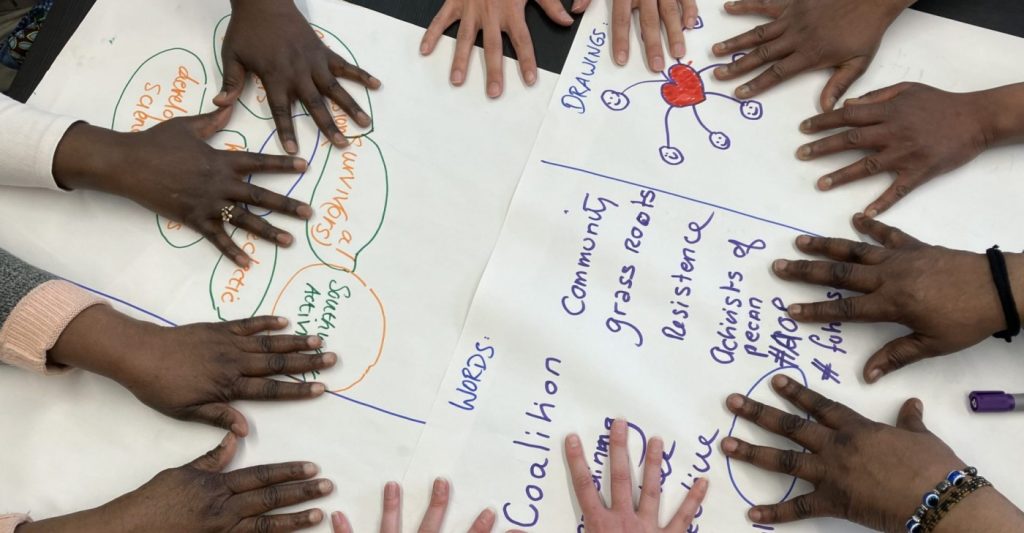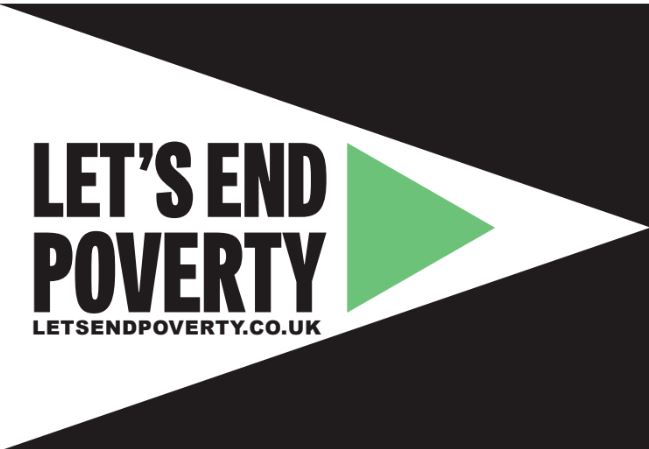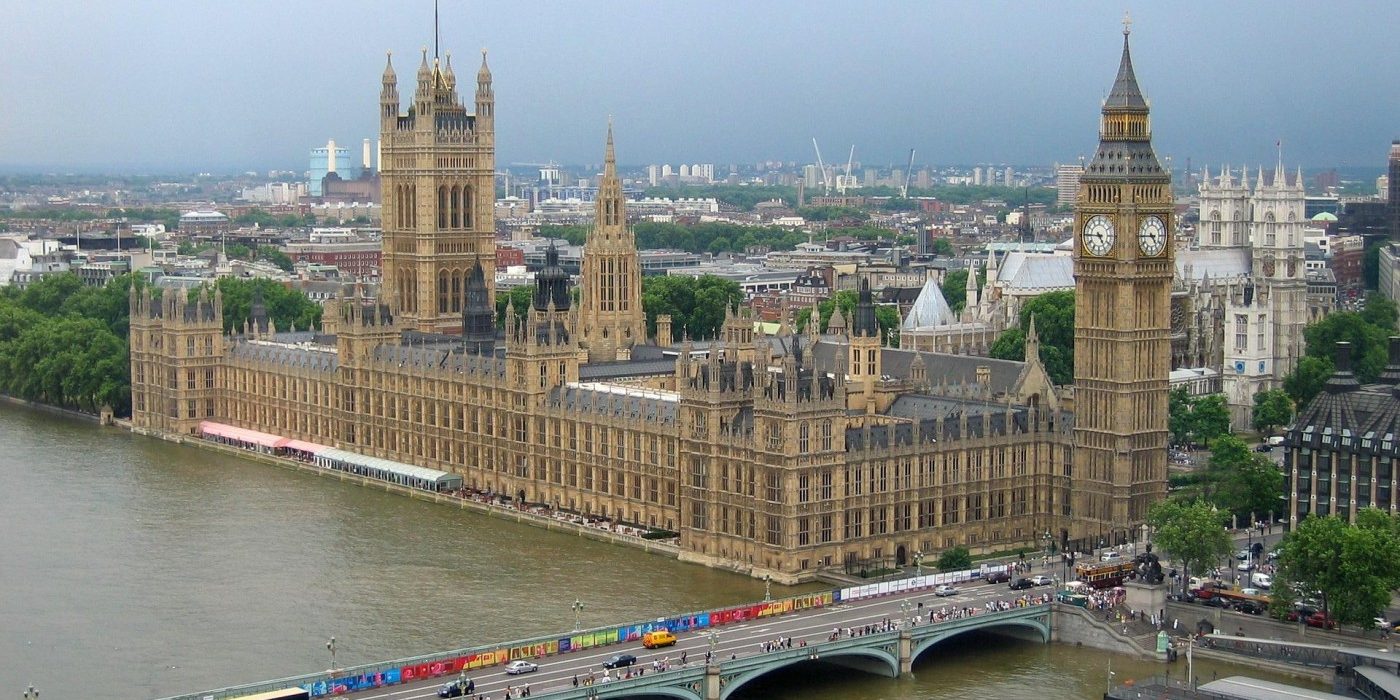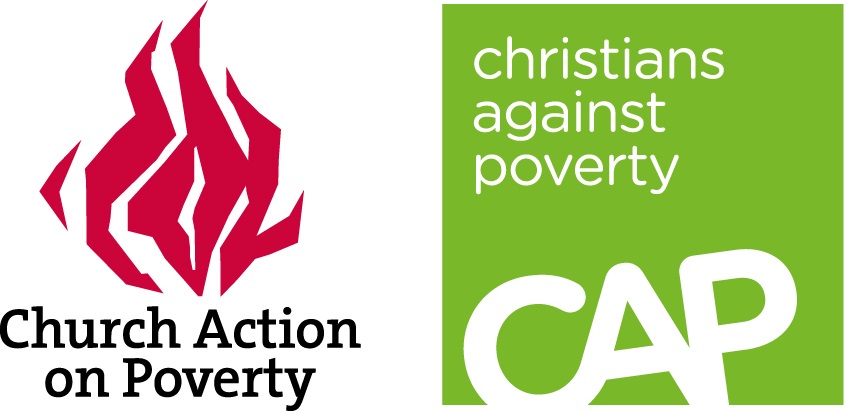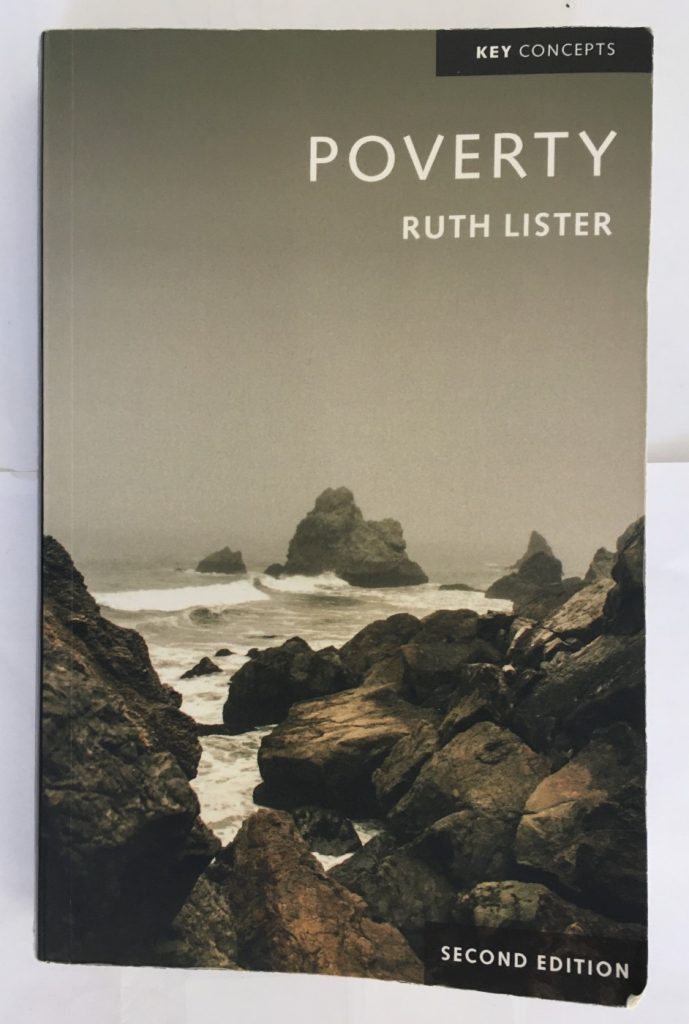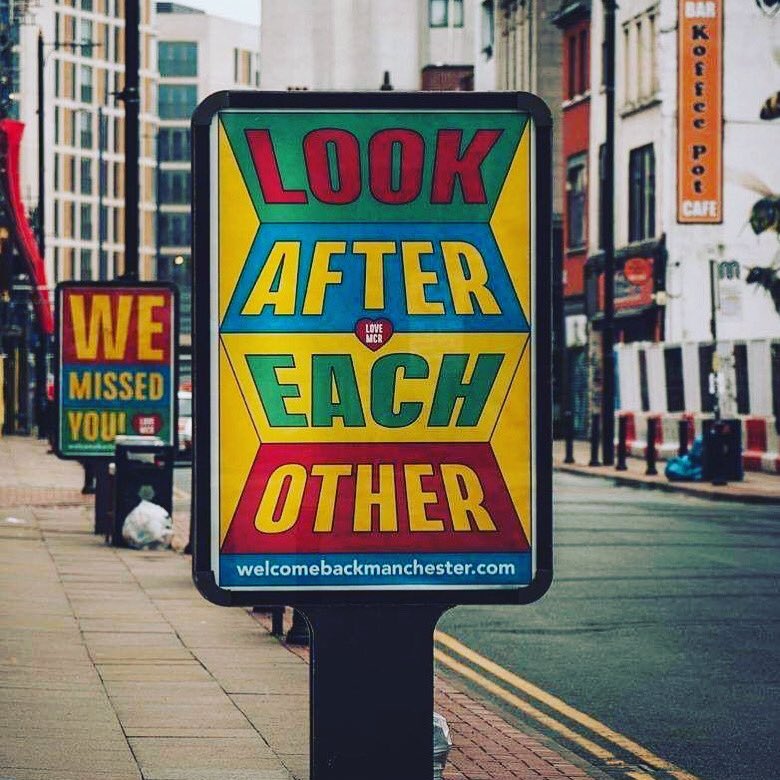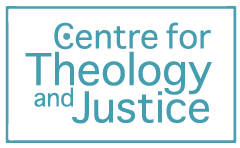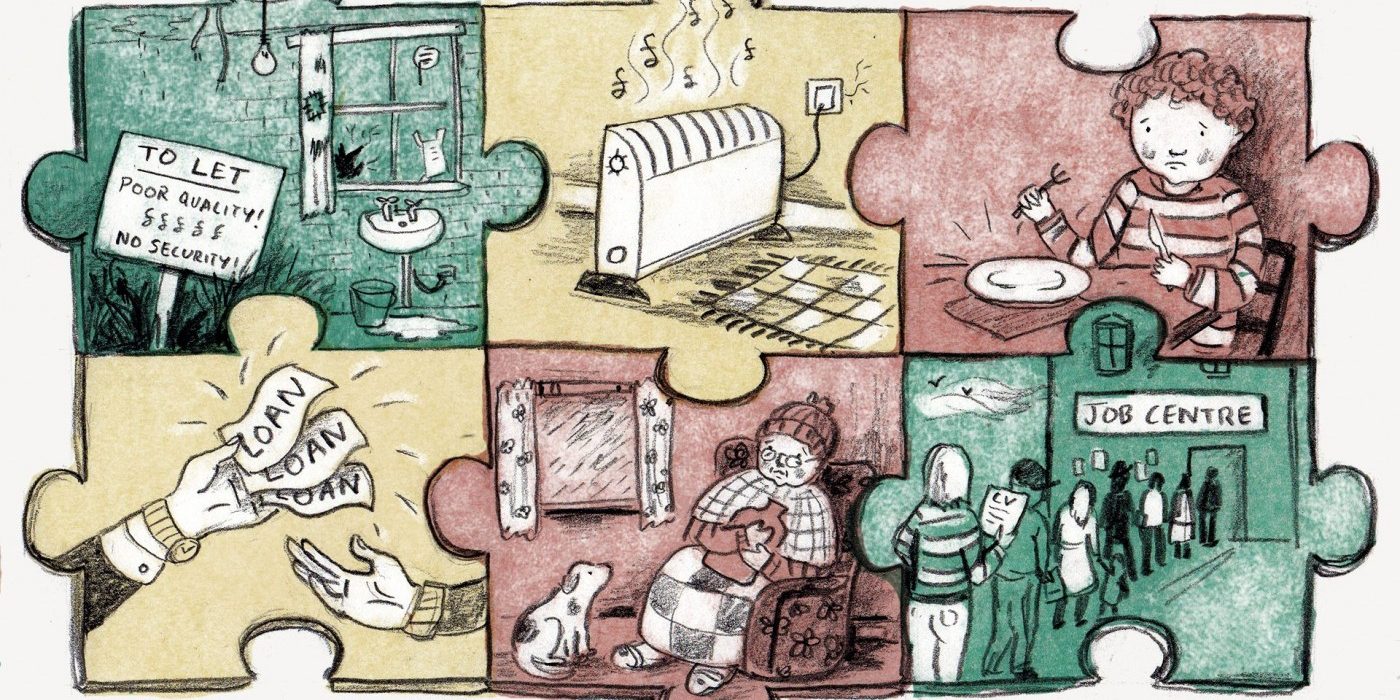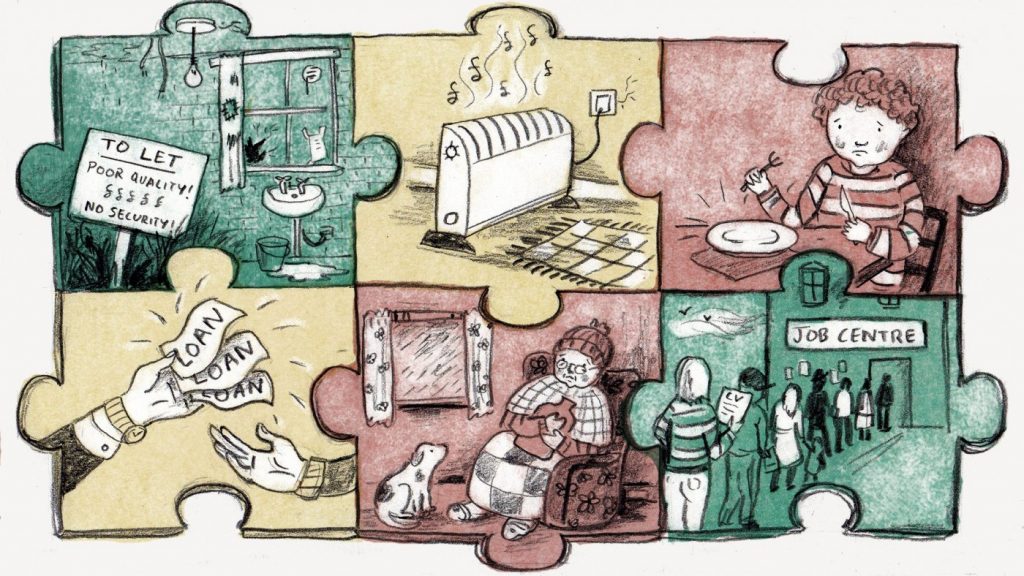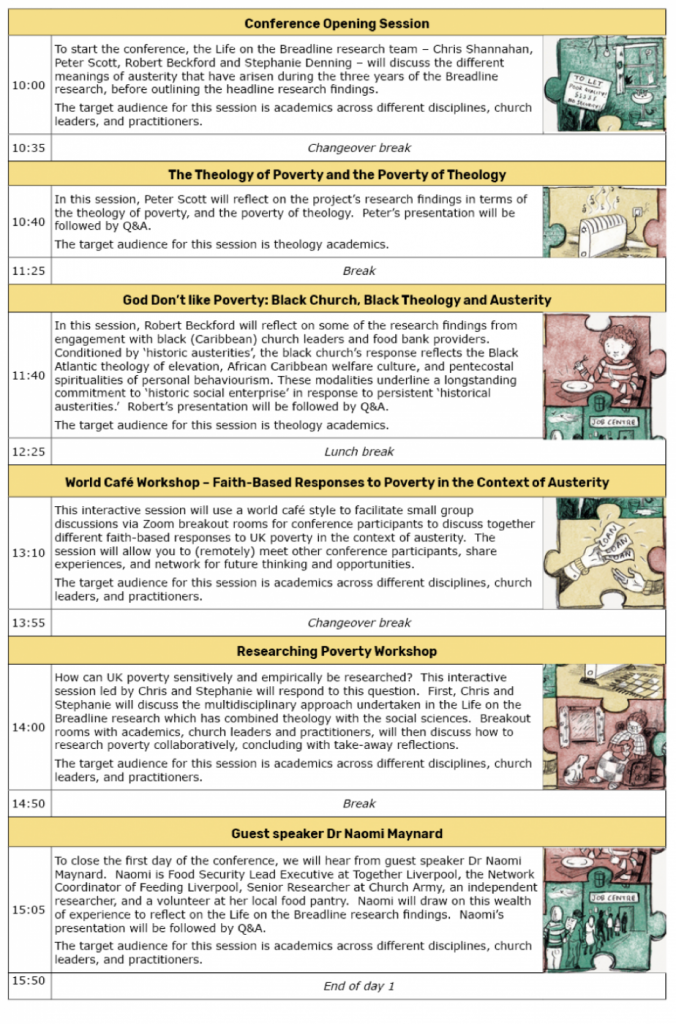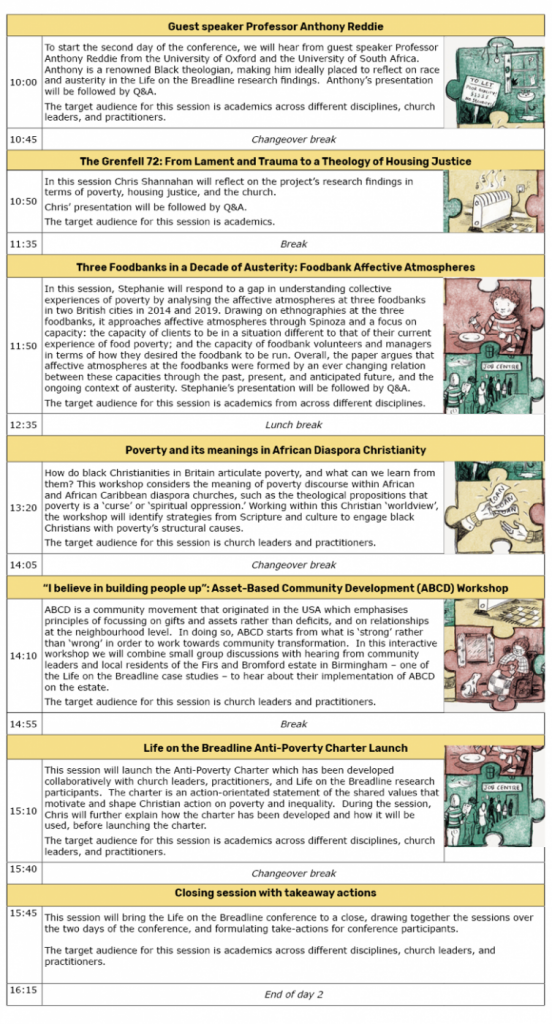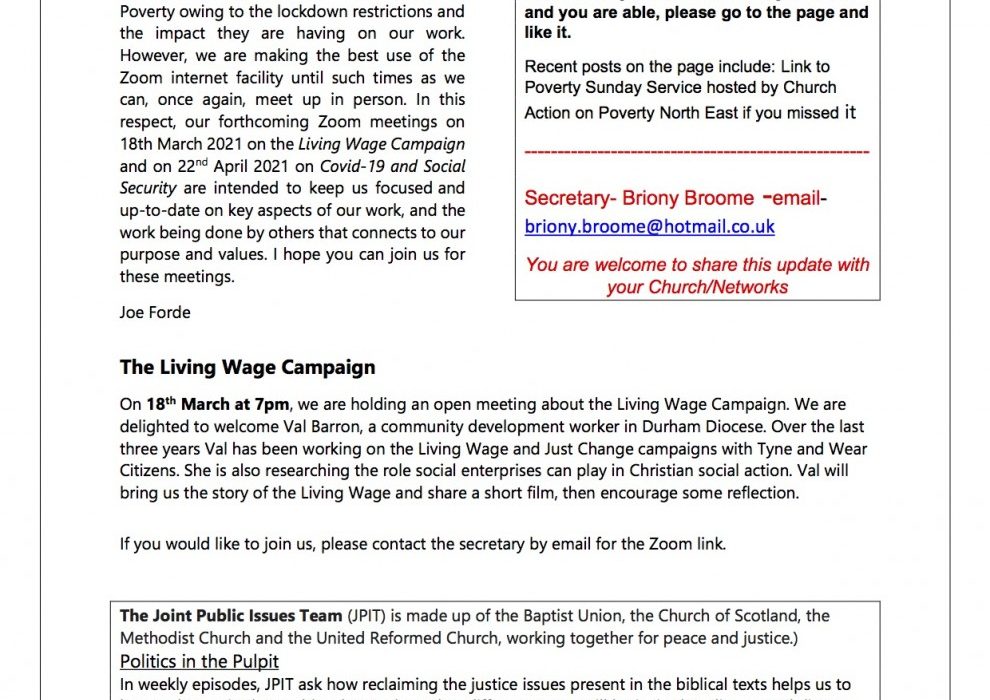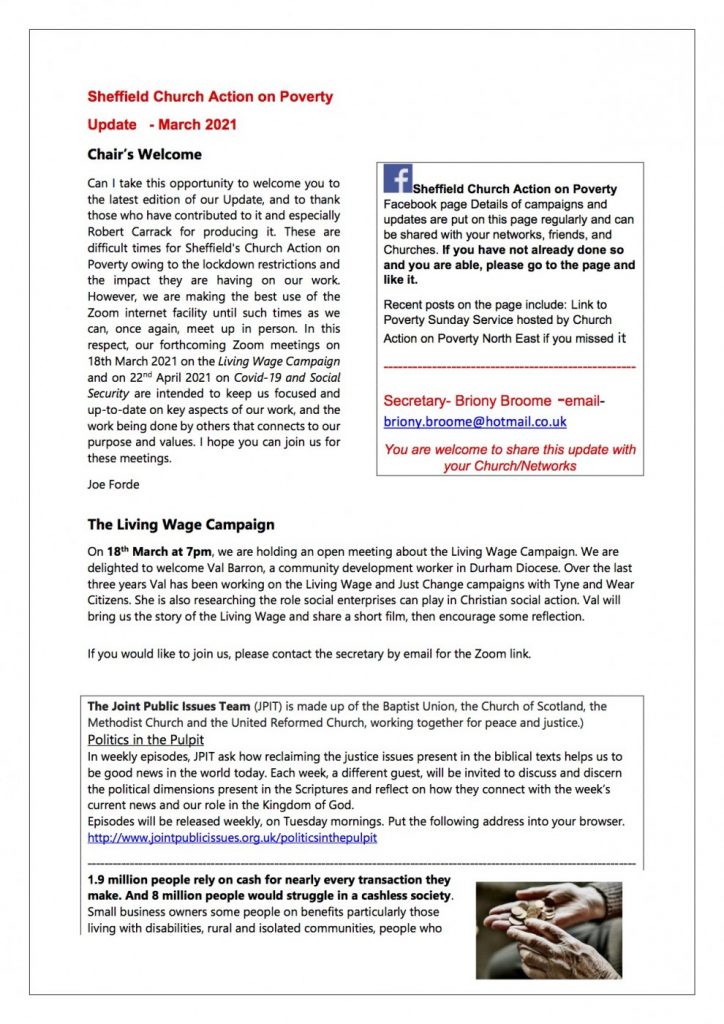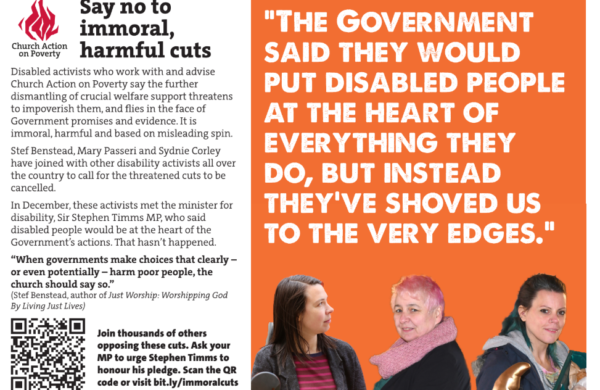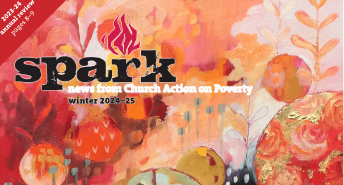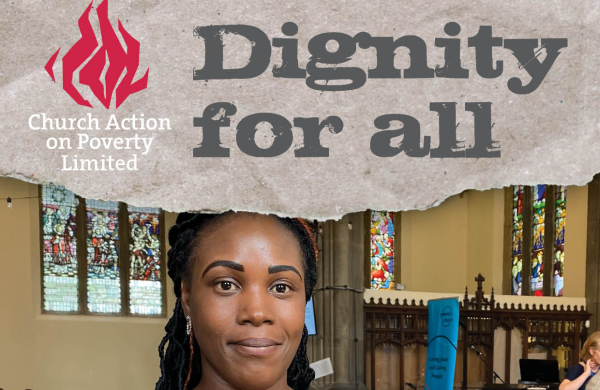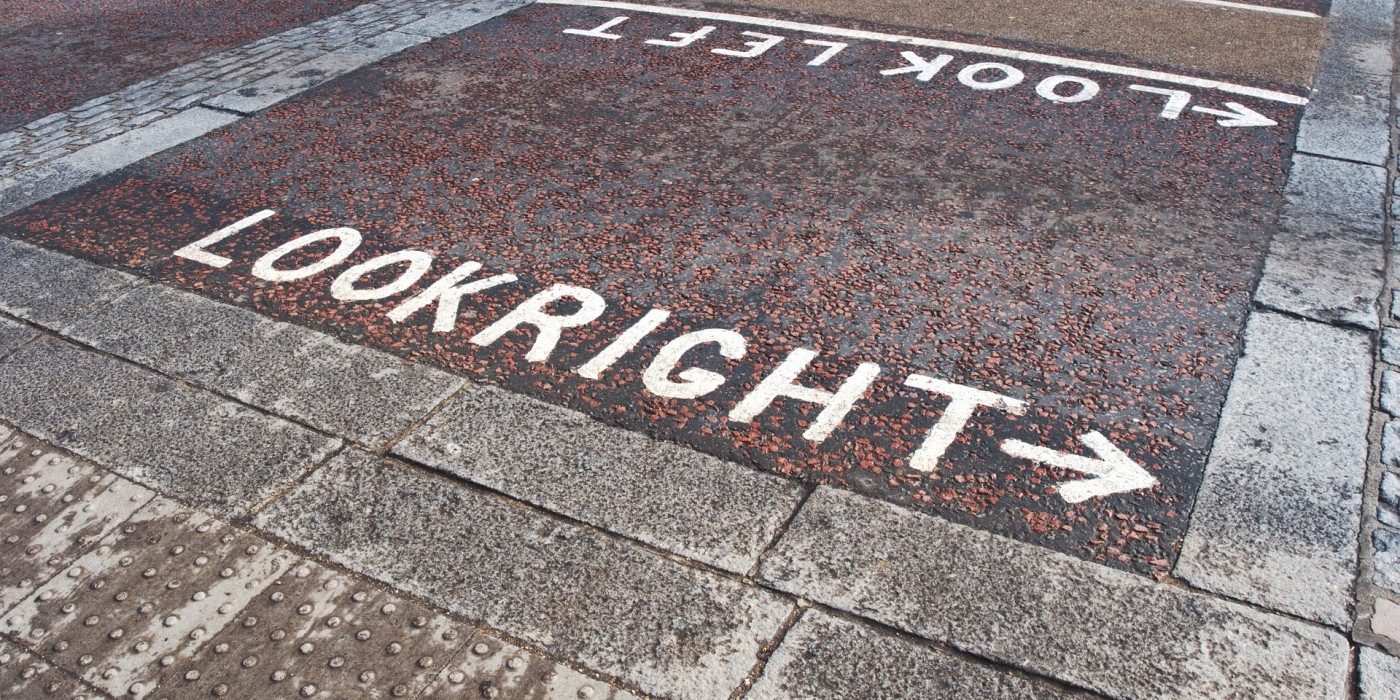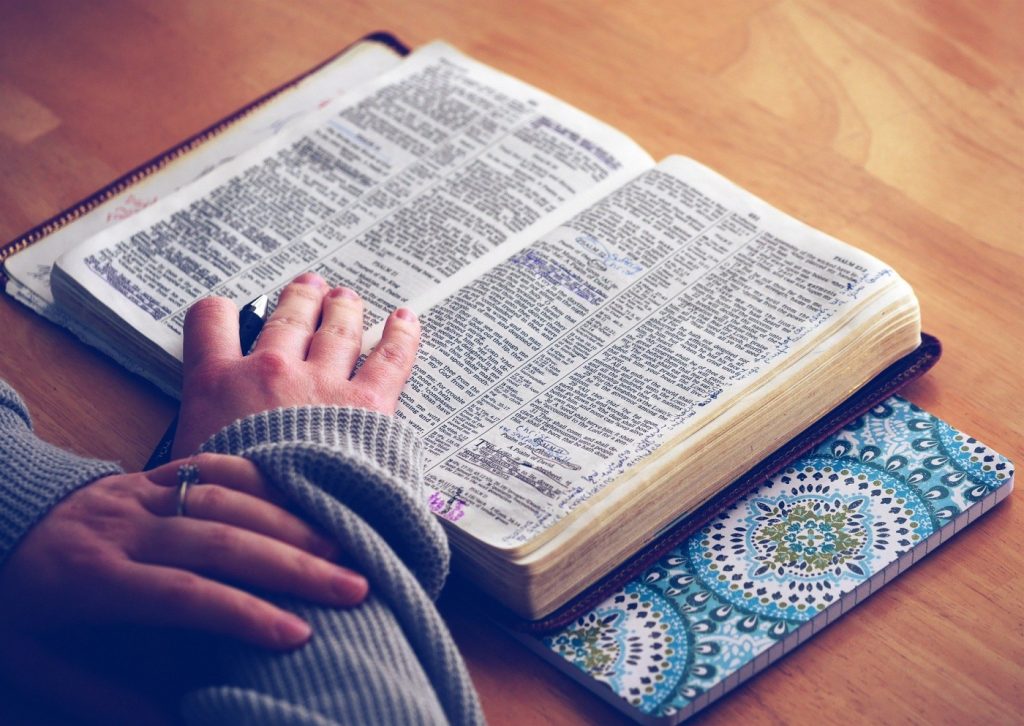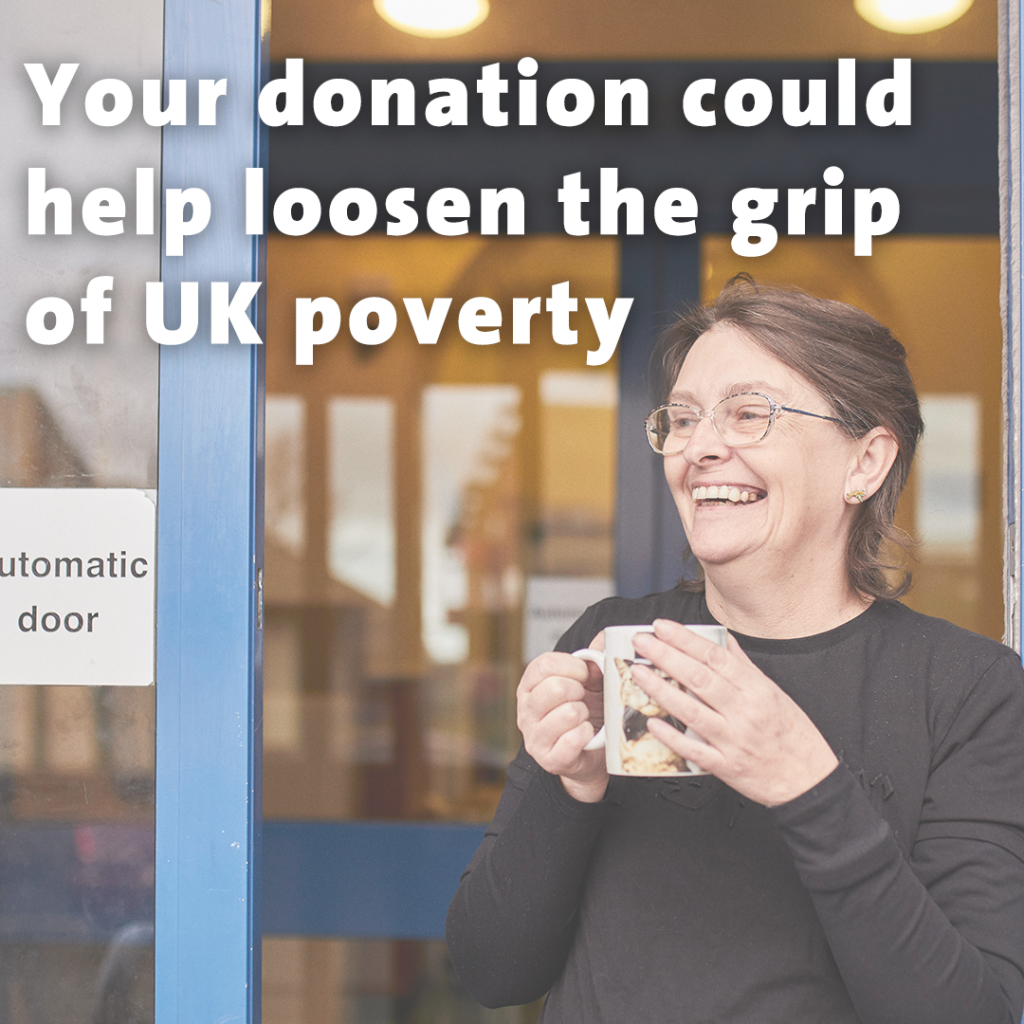Rt Hon Boris Johnson MP
Prime Minister
10 Downing Street
London
SW1A 2AA
27 September 2021
Dear Prime Minister,
We stand together as church leaders from across the UK to urge you to think again about cutting Universal Credit payments by £20 a week from the start of October.
If the Government persists with this cut, it would be the single biggest overnight reduction in the basic rate of social security since the welfare state was established in the 1940s. Millions of low-income households will be swept further into poverty as a result.
As Christians, we are compelled by the gospel imperative to prioritise the needs of the poorest and most vulnerable.
As church leaders, we must speak up, because of the impact this will have on our poorest neighbours and church members.
We urge the Government to choose to build a just and compassionate social security system that our whole society can have confidence in.
Even before the Covid-19 pandemic, poorer people in communities all over the country were suffering because the lifelines they needed from our social security system and vital neighbourhood services were not strong enough. Analysis by the Joseph Rowntree Foundation has shown that the cut will particularly hit the north of England, the West Midlands, Wales and Northern Ireland. Rather than levelling up the UK, this will compound existing inequalities.
The loss of £1,040 a year will be devastating for many families at a time when energy bills and other household costs are increasing. Instead we can make sure our social security system brings stability, and opens up options and opportunities for people whose income is too low or insecure to make ends meet.
The cut has already been opposed by community groups up and down the country, charities, six former Conservative Work and Pensions Secretaries, and many MPs from all parties. This is an opportunity for the Government to send a message that it listens, and recognises the pressure faced by those on the breadline.
Universal Credit has been a vital lifeline throughout the pandemic. For the sake of millions of families, it must be retained at its current level, and we therefore reiterate the calls for the planned £20 a week cut to be withdrawn.
Yours sincerely,
Nicholas Adams, Louth Methodist Church
Jenny Adams, Duffus Spynie and Hopeman Church of Scotland
Jonathan Adams, Sunderland Minster
Rebecca Aechtner, St Paul’s Scotforth
Janice Aitken, Kelsall Methodist Church
Rosemary Aldis, Sr Mark’s, Heath Park
Keith Aldred, St Peter’s St. Albans
Iris Aldridge, Unity Church
Katie Alexander, Garland St Baptist
Torquil Allen, Frampton Park Baptist Church
Michael Allen, St. Mary’s Arnold
Trevor Allin, New Life Community Church
Angela Allport, St John’s Methodist Church, Hereford
Kathryn Alvis, Glebe Farm Baptist Church
Ian Anderson, Methodist Church
Christopher Anderton, Redeemer, Blackburn
David Andrews, Methodist church
Revd. Caroline Andrews, Saltaire United Reformed Church
Marianne Anker-petersen, Bield at Blackruthven retreat centre
Robin Anker-Petersen, Bield at Blackruthven retreat centre
Stephen Ansa-Addo, Park United Reformed Church and Hungerford United Reformed Church
Nick Archer, Church of Scotland
Keith John Argyle, Retired United Reformed Minister
John Armes, Bishop of Edinburgh, Scottish Episcopal Church
Bernard Arnold, Ely Methodist
Marieke Arthur, Canton Uniting Church
John Ashcroft, Religious Society of Friends (Quakers) Lewes
Vincent Ashwin, Southwell Minster
Bernadette Askins, Churches Together South Tyneside
Barbara Aspinall, Edgeley Community Church
Richard Astill, Grace Community Church
Howard Astin, Bradford Prayer For Bradford
Heather Aston, Boscastle Group of Churches
Ann Atkins, Downsview Methodist Church (Croydon Circuit)
David Austin, Holy Trinity Coldhurst
Philip Averay, St Mary’s Priory, Chepstow
Gillian Baalham, The Methodist Church (Redhill & East Grinstead Circuit)
Susan Baggott
Patricia Baggott, St Swithun Wells
Steve Bailey, St Paul’s, Oadby
Hazel Baird, Culybackey Methodist Church
Maria Baker, Trinity Chippenham Church
Richard Baker, United Reform
John Baker, Earl Shilton Metodist
Rev. Dr. Nelu Balaj, Livingston Old Parish Church
Kathleen Baldwin, Methodist Church Herefordshire (South and East) Circui
Jennifer Bales, Goldsithney Methodist Church and Local Preacher
Stephen Bales, Lizard and Mounts Bay Methodist Circuit
Dan Balsdon, Methodist Church
Amy Barker, Walsgrave Baptist Church
Matt Barlow, The Light Church
James Barnard, Cheadle Hulme Baptist Church
Helen Barnes, Our Lady of Lourdes, Lee
Anthony Barnes, North Wiltshire Methodist Circuit
Helen Barrett, Fore Street Methodist,Brixham
Richard Barrett, Methodist Church
Kate Barrett, Methodist Church
Revd Dr Al Barrett, Hodge Hill Church
Sara-Jane Barron, Love Looe
Rev Diane Barrow, Toll Bar with Prescot URC; Newtown URC
Salah Bastawrous, St Mary and St Abaschyroon Coptic Orthodox Church
David Batchelor, St Andrew’s Methodist, United reformed Church, Skipton
Michael Bate, Church of the Epiphany, Oxley
Timothy Bateman, Gas Street Church
Kathryn Beamish, Cairneyhill Parish Church
Pauline Beattie, Walsall Central Hall
Adrian Beavis, Christ Church Woking
Pat Beazley, Holy Innocents Kingsbury
Ruby Beech, Hope Community Methodist Church Newark
Russ Beese, Witney Community Church
Gillian Belford, Penrith Methodist Church
David Bell, Unity Church Orpington
John Bell, The Iona Community
Carole Bell, Unity church
Ray Bell, Unity church
Susan Bennet, Northumbria Quakers
Geoffrey Bennett, St Budock
Mehwish Bhatti, Victoria Park Baptist Church
Nigel Bibbings, South Bedfordshire Methodist
Ian Bickerstaffe, King’s Church High Wycombe
Heather Bingley, Bridlington Deanery
Colin Birnie, St.Clements Belfast
Kevin Birtles, Jinny
Sheila Bishop, Gawsworth Methodist Church Gawsworth Cheshire
Biddy Bishop, Polperro Methodist
Penny Bissell, Durham City Methodist Church
Gina Bisset, Grace Church Family
Gregory Black, Wesley Methodist Church
Edmund Blackie, Society of St Francis
Ross Blackman, Hamilton Old Parish
Rosemary Bland, Holy Trinity, Haddington
Nick Blundell, Bradford North Circuit
Tim Boaden, Seedfield Methodist Church
Bev Boden, St John’s Methodist Church
Philip Bodey, Grove Lane Baptist Church
Sheila Bodey, Grove Lane Baptist Church
Joanne Bond, The Well Retford Baptist Church
Teresa Bond, St Thomas More Middlesbrough
Jacky Bone, St Mary’s Church Witney
David Bonnett, Pakenham Christian Fellowship
Pat Booth, Bromsgrove methodist
Laura Booth, Bromsgrove metjodist
Duncan Booth, Cheadle Hulme Methodist Church
Mike Bossingham, Cromer Methodist Church
Irene Bourne, Romsey Methodist Church
Erica Bowler, Love Purfleet
Steve Bownds, Latymer Community Church
John Boyd, The Gathering Methodist Church – Sunderland South Circuit
Jean Boyd, Drumoak Durris
Jonathan Boyers, The Peoples Church
Nic Boyns, Cherry Hinton Baptist Church
Michele Bradbury, St Mark’s at Friday Bridge and Coldham
John Bradbury, General Secretary, United Reformed Church
Rev Matthew Bradley, Creech St Michael Baptist Church
Bronwen Braisdell, Epworth & Scunthorpe Methodist Circuit
John Bramhall, St Mary’s Greenham
Alan Brand, Renew Church, Cambridgeshire.
Christopher Brann, Ascension Bath
Graham Brazier, Churches Together in Stourbridge
Derry Brebner, Fodderty and Strathpeffer Church
Joan Breen, Our Lady of Mercy Institute
Wendy Brennan, Skipsea Methodist Church
Ruth Brew, Freedom Church Liverpool
Amanda Briggs, The New Room, Bristol
Roger Bristow, Holy Trinity Church, Bromley Common
Alison Britchfield, Tillicoultry Parish Church of Scotland
Richard Britton-Voss, Ruskington Methodist Church
Margaret Brock, St George’s, Morpeth
Ian Brodie, Shrivenham Methodist Church
Diane Brooke, Christ Church Bridlington
Colin Brough, Fintry Church, Dundee
Deirdre Brower Latz, Nazarene Theological College
Sarah Brown, Castlemilk Parish Church
Kenneth Brown, Livingston United Parish Church
Judith Brown, RC
Terence Brown, St Mary’s Crowborough
Pat Brownmarlow, Marlow Methodist
Ramon Bruzzichessi, Grosvenor Church Barnstaple
Julie Bryan, West Craven Baptist Church
Estelle Buckley, The Triangle Methodist Community Church
Carolyn Buley, St Mark’s Methodist Church, Cheltenham
Philip Bunce, Shrivenham Methodist
Roz Burch, SoundCafe Leicester – a Bishop’s Mission Order
Peter Burgess, Southend Christian Fellowship
Carol Burns, St Benedicts, Garforth, Leeds
Hugh Burton, St Francis Dudley
Firsl Mike Bush, Rodley
William Butchart, Ellon Baptist Church
Debbie Butland, Freedom Church Liverpool
John Butler, The Parish Church of St. Paul, Shipley
Paul Butler, Bishop of Durham, Diocese of Durham
Revd David Butterworth, Methodist Church
Robert Byrne, Bishop of Hexham and Newcastle, Diocese of Hexham and Newcastle
Jenny Bywaters, Millhouses Methodist Church
Prudence Cahill, Methodist Central Hall, Manchester
Bryce Calder, Motherwell St Mary’s
David Callander, Ilkley Baptist Church
Barbara Calvert, The Cotteridge Church
Alastair Cameron, South East Scotland Area Quakers
Foluke Campbell, Audacious Church
Dawn Canham, The Lantern Methodist Church
Steven Cann, Our lady of lourdes
Mike Cansdale, Keighley Parish
Lindsay Caplen, Baptist Regional Minister
Mark Carey, Christ Church Bridlington
Eileen Carlin, Brayton Methodist Church
John Carlisle, St Williams
Barbara Carroll, Roman Catholic
Debbie Carruthers, KingsGate Church Helston
Jane Carter, Bede Methodist circuit
George Carter, St Matthew and St Lenoard Bootle
Maria Carter, St David’s Methodist Church
Carol Carter, Woodstock Methodist Church
Rhona Cathcart, Inverurie West Parish Church
Andy Chadwick, Reach Church
Lesley Chandler, Religious Society of Friends (Quakers) Falmouth Meeting Cornwall
Michele Chapman, The Countess Free Church
Neil Chappell, Southam Congregational Church
Dawn Charles, The Community Church, Burton and District
Steve Charman, Lancaster Methodist Church
Jon Chesworth, Shropshire and Marches Methodist
Steve Chick, Hop Church Winchester
Dave Chislett, ChristChurch
Chris Chorlton, Parish of Girlington, Heaton and Manningham
Margaret Christopher, St Andrew’s Skipton
Rev John Churcher, Methodist Church
David Clark, Oakham Baptist Church
Rod Clark, St Chad’s, Lichfield
Mel Clark, Elim Gateway Bradford
Wayne Clarke, Trinity Baptist Church, Gorton, Manchester
Stuart Clarke, Melbourn Baptist
Graham Clarke, Marshalswick Baptist Free Church
Penny Clarke, Christ Church, Bridlington
John Clarkson, Wigan Baptist Church
Georgia Clarkson, Wigan Baptist Church
Richard Clarkson, St Peter’s, Kinver
Geoffrey Cleave, United Church Bradford on Avon
Peter Clements, Saltash Wesley Methodist
Bruce Clifford, ST Catharine’s Gloucester
Roger Clifford, Craigavon Trades Council
Leonard Clift, Stormore Baptist Church
David Clitheroe, Temple Methodist Church, Taunton
Iain Cloke, Highfield Trinity Methodist Church, Sheffield
Patrick Coad, St Andrew’s
Roswitha Cods, Kensington temple
Nigel Coke-Woods, South Worcester Circuit
William Cole, Holy Cross Bobbington
John Coleby, Caritas Westminster
Paul Coleman, Leeds North and East Methodist Circuit
Michael Collins, Hadleigh Baptist Church
Christopher Collins, Evesham Methodist Church
Jennie Collins, The Pathway Methodist Church
Christopher Collins, South Worcestershire Methodist Circuit
Michelle Compton-Large, Whitehouse Baptist Church
Chris Condrup, Gloddaeth
John Cook, Howe Trinity Parish Church
Tanya Cook, Kingswood Methodist church, Wollaton
Jon Cook, Kings Church Eden
Helen Cook, St Ninians Old Parish Church Stirling
E. Cooke, St Stephen
Revd Naomi Cooke, Bethesda Methodist Church
Ann Cooke, Church Stretton Methodist church
Lynne Cooper, Forest Town Methodist
Lynda Coulthard, Methodist Church in South East Northumberland Ecumenical Area
Revd Nigel Cowgill, The London District of the Methodist Church
Christine Crabtree, Bradford North Methodist Circuit
Simeon Cracknell, Canon Street Church
Patricia Craig, Church of The Assumption
Michael Craig, Portobello and Joppa Parish Church
John Crawford, Tiverton Vineyard Church
Margaret Crawshaw, Somerset Mendip Circuit
Roger Cresswell, Fund for Human Need
Richard Cresswell, St Mary the Virgin, Shawbury
Graham Criddle, West Street Christian Fellowship
Dan Cronin, HEART Church
Colette Cronin, Sister
Phil Crouter, St Pauls, Weston-s-Mare
Toby Crowe, St John’s, Sparkhill
Claire Crowley, Churches Together in South London
Tim Croxson, C3 UnitedLife
Diana Cullum-Hall, The Church at Carrs Lane
Iain Cunningham, Kirkton Parish Church, Carluke
Deborah Curnock, Metropolitan Community Church, Birmingham
Simon Curry, Larne Baptist Church
Richard Curtis, Cannings and Redhorn Benefice
Alistair Cuthbert, Falkirk Baptist Church
Michelle Cutting, IIC
John Dale, Church Action on Poverty and Forres Parish
Mariot Dallas, Religious Society of Friends (Quakers), Polmont Meeting
Jock Dalrymple, St John’s, Portobello, Edinburgh
Sheree Daly, United Reformed church in Rhyl
Mary Davidson, St Mark’s United Reformed Church
Ceri Davies, River Church
Elizabeth Davies, United Reformed Church
Robert Davies, Glossop and Tameside Methodist Circuit
Jess Davis, St Peter’s Birstall
Maria Davison, St Albans R C , Macclesfield
Rachel Dawson, The Light Church
Liz Day, Addingham Methodist church
Janet de Maine, St Boniface
Dorothy Dean, Maldon URC
Bruce Dear, Southgate
Judy Dennis, Trinity Church, Enfield
Keith Dennis, Hall Green United Community Church
Robert Dennis, New Hope
Jane Denniston, Campsie parish Church
Gareth Dickens, The Salvation Army – Winsford
Shuna Dicks, Cults Parish Church of Scotland
Robert Dimmick, Caversham Park Church, Reading
Judith Dimond, St Paul and St Martin, Canterbury
Peter Dixon
David Dixon, Selsey Methodist Church
Catherine DOBSON, Wesley Memorial Methodist, Oxford
Kenneth Donald, Prestongrange Church
Marion Donald, Cairneyhill Parish Church
Rosemary Donohoe, St Bridget’s
Sandra Doore, St Marks Church, Childwall Valley & Gateacre Team Ministry Liverpool
Neil Douglas, Ebenezer Baptist Church
Terry Down, Unity Church Orpington
Ian Dowsett, St Paul’s South Harrow
Neil Draisey, Beckenham Baptist Church
Lorraine Drinkwater, St Marys Potsea
David Driscoll, Holy Trinity Bradford on Avon
Alison Duncan, Montrose South and Ferryden
Mary Duncanson, Cromdale & Advie
Steve Dunn, The Beacon Church Herne Bay
Jonathan Dunning, Meadowhead Christian Fellowship
Kay Dyer, Holy Trinity
Cath Dyer, The Religious Society of Friends
Kathleen Dymond, Midsomer Norton Methodist
Nick Eades, East Plumstead Baptist
Dave Eadie, Roundswell Church
Donald Eadie, Methodist
Matthew Earl, Emmanuel Church Eastbourne
Vicky Earll, St Michael Le Belfrey
David Easton, Stockton Heath Methodist Church
Richard Eddleston, Beeston Quakers
David Edmondson, Dalton Community Church
Stephen Edney, Maidstone Family Church
Adrian Edwards, Castleton Baptist Church
Marion Edwards, Rogiet Methodist Church
Edward Egan, Brother
Aaron Elder, Oxgangs Community Church
James Ellis, Evesham Methodist
Caleb Ellwood, Gateway Church – York
Gerald Elvin, St Barnabas, Manor Park
John Emmett, Methodist Church
Lynn Emmott, St Margaret’s Liverpool.
Esther Ensing, Amazing Grace Church
Maureen Etherington, Coleford Baptist Church
Judy Evans
Sarah Evans, Christ church Bridlington
Simon Evans-White, Halton Baptist Church
Dub Everitt, Welcome Church
Stephen Ewing, Crofton Park Baptist Church
Jeremy Fagan, St. Martin’s Church, Southdene, Kirkby
Martin Fair, St. Andrew’s, Arbroath
Nathan Falla, Newark & Southwell Methodist Circuit
Margaret Fancy, Arkholme Methodist Church
Diana Farmer, St James’, Wollaston and St MIchael’s, Norton
Katharine Farnham-Dear, Southgate Methodist Church
Sheila Farnsworth, Ludham Methodist Church
Ian Farnsworth, South East Northumberland Ecumenical Area
Geoffrey Farrar, Putney Methodist Church
Tony Farrar, St. John’s Whitley Bay
Jon Farrimond, Liberty Church, Dunfermline
Anne Farrow, Centenary Methodist Church Crawcrook.
Rachel Fasham, Christ Church
Susan Fender, The Linked Pastorate (URC)
Patricia Fenton, St Luke’s Harrogate (Parish of Bilton, St John & St Luke)
Cristine Ferguson, Stromness Church of Scotland
John Ferguson, Peterculter Parish Church
Oliver Fernandes, St Francis de Sales RC Church – Hampton
Camille Fidgett, Catholic Parish of Hemel West
Jade Fielding, Holy Saviiyrs
Jonathan Fillis, Haddenham-cum-Dinton Baptist
Dennis Finch, Hedge End Salvation Army
Sean Finlay, Wisbech Churches Together
Kay Finnegan, Sister
David Firth, Methodist Church
Sue Fisher, Lindsay Park Baptist Church
Neil Fisher, Christ Church, Lewes
Derek Fitchett, All Saints, Trefonen, Oswestry
Abigail Flavell, River City Church Hull
Dean Flay, Unity
Jonathan Fleming, Greenock Lyle Kirk
David Fleming, Rugby Baptist Church
Suzanne Fletcher, Dunglass Parish Church
Hedy Fletcher
William Fletcher, Central Sussex United Area
John Flitcroft, St Mary’s, Old Swinford
Jean Flood, St Nathanael
Geoff Floyd, Sheldon Road Methodist, Chippenham
Gifford Foote, Handsacre Methodist
Ann Ford, Hall Green United Community Church
Carole Ford, St Marys Horsell
Dr Joseph Forde, St Mark’s Church, Bromhill & Broomhall.
Bea Foster, Hapton Methodist Church
Sean Fountain, Pier Avenue Baptist Church Clacton on Sea
Richard Fox, The King’s Church, Addlestone
Aileen Fox, The Pilgrim Methodist Church Blakeney
Michael Fox, Unity Church
Carolyn Frayne, Frodsham Methodist Church
Helen Freeston, Copmanthorpe Methodist Church
Richard Frith, Southwell Minster
Stephen Froggatt, Kingsbury Methodist Church
Carol Fry, Redland Park URC
Ruth Fry, Methodist Church
Daniel Fryer, Jubilee Church Hull
Helen Fuller, King’s Church
Ian Gall, Riverside Evangelical Church
Simon Gatenby, Brunswick Parish Church
Sally Gathern, St Mary’s in Singleton
Neil Gatland, Billingshurst Family Church
Jessica Gatty, Religious of the Assumption
Lisa Gauntlett, St Paul’s Chichester
Alison Geary, Methodist Church, Birmingham Circuit
Andrew Geldart, Oceans Community Church Bude
Alice Gem, Wallington Methodist Church
Martin Gem, Wallington Methodist Church
eddie george, Nantwich Methodist Church
Margaret Gibbs, Perry Rise Baptist Church
Rachel Gibson, St. John’s
Liz Gibson, North Mull Church of Scotland
Anne Gibson, Kelsall Methodist church
Mark Gilks, Hampton Mission Partnership
Linda Gilson, Wolverhampton Methodist Circuit
Helen Glass, Arnold URC
Neil Glover, Aberfeldy, Dull and Weem, Grantully, Logierait and Strathtay
Andy Glover, Hoole Baptist Church
Shirley Godfrey, St. Andrew’s Methodist Church
Ben Goodyear, Parish of Herne Hill
Roger Gordon, North Shields Methodist Church
Stuart Gosling, New Life Church
Michael Goss, Barry l/w Carnoustie
Christine Goudie, Murrayfield Parish Church
Louise Gough, Trinity Church Cheadle
Ruth Gouldbourne, Grove Lane Baptist Church, Cheadle Hulme
May Grafen, St John’s Evangelical Church Linlithgow
Paul Graham, Clare Baptist Church
Peter Grainger, Allnations Wolverhampton
Norman Grant, Cairneyhill linked with Limekilns Parish Churches
Kate Gray MA, The Dandelion Community – the United Reformed Church, Wythenshawe
John Grayson, Standish Methodist Chursh
Stephen Greasley, Gillingham Baptist Church, Kent
Lynn Green, General Secretary, Baptist Union Of Great Britain
Jacqui Green, Stony Stratford community church
Catherine Green, St Columba’s Chester
David Gregory, Croxley Green Baptist Church
Angus Gregson, New Brunswick United Reformed Church
Margaret Greig, Howe of Fife Parish Church
mark Griffin, st Martin and St Paul, Canterbury
David Griffiths, Horwich Team of Churches
Leila Griffiths, Methodistiaid Calfinaidd
John Grimes, Denton Methodist Church
Philomena Grimley, Parish of Christ the King and St Kentigern Blackpool
Robert Grimshaw, The Gate Community Church
Ross Grindlay, St Margaret’s Portsmouth
Kevin Gripton, Churches Together in Brierley Hill
Heston Groenewald, All Hallows, Leeds
Margaret Guite
Phil Gunn, Rosskeen Parish Church of Scotland
Carol Guyers, Brunshaw Methodist Church
Anne Hackling, Pontllanfraith Methodist church
Andrew Haddow, Parish Church of Coldingham & St. Abbs lw Eyemouth Parish Church
Ian Hague, The Parish of Walton Breck, Liverpool
Phil Haines, South Kent Community Church
Oriole Hall, Inverness Quaker Meeting
Sarah Hall, Avenue St Andrew’s URC
Tony Hall, Hope Church Bromley Borough
Sue Halliday, Hope. Church
Revd Ian P. Hamilton, Dialstone Lane Methodist Church
Clive Hamilton, Salford All Saints Team Ministry
Elizabeth Hamilton, Leyland Baptist Church
Jane Hampson, Deane Church
Michele Hampson, Warden Sacrista Retreat House
Ros Hancock, S. Beds Methodist Circuit
Allison Hanshaw, Seascale Methodist Church
Karen Harbison, Greenock Westburn
Ashley Hardingham, Altrincham Baptist Church
George Hardman, Methodist Chuch
Richard Hare, Emmanuel, Bridlington
Mark Harlow, St Paul’s Church, Ireland Wood
Rev’d Dan Harper, Bridge of Allan Parish Church
Daniel Harris, United Reformed Church
Michael Harrison, Llandudno Cytun / Churches Together
John Harvey, The Iona Community
Graham Harvey, Hope Church, Dawlish
The Very Rev’d Joe Hawes, St Edmundsbury Cathedral
Rachael Hawkins, All Saints’ Church, Berkhamsted
Rev Dr Graham Hawley, The Ridge methodist Church Marple
David Hawtin, Wakefield Cathedral
Linda Hayes, Freemantle Baptist Church
Philip Hayllar, Sacred Heart & St Peter the Apostle Waterlooville
Maureen Hazelwood, St Francis of Assisi Kenilworth
Richard Heard, St Francis Church
Nick Heaton, St. David’s Holmbridge
Joanna Hellenbrand, Eastwood Baptist Church
Elfriede Elisabeth Helliar, Dorridge Methodist
Terry Hemming, Church of England
Julian Hemmings, St Francis of Assisi, Rhayader
Terry Henry, Fountains Church Bradford
Rosemary Henry, Cairneyhill Parish Church
Graham Hepburn, Canada Common Methodist Church, Wellow, Hampshire
Paul Heppleston, Wellspring Wirksworth
David Hepworth, Adwick-le-Street Methodist Church
Ali Herbert, St Luke’s Gas Street
Lynsey Heslegrave, New Growth Ministry (Baptist)
Tom Hibbert, St John’s Buxton
Christine Hide, Daventry Methodist Church
Helen Higgin-Botham, Christ Church (Methodist & United Reformed Church)
Anne Higginbotham, Trinity Hillsborough
Robin Hill, Gladsmuir linked with Longniddry
Brenda Hill, Central United Reformed Church Sheffield
Revd Jonnie Hill, Greater Manchester South & Cheshire Missional Partnership
Jonathan Hill, St Martins Hull
K. Hilton-Turvey, S. Michael’s Ledbury & S. John’s Eastnor
Sheila Himsworth, Evesham Methodist Church
Evelyn Ho, Stratford. Upon Avon Methodist
Lim Ho, Stratford upon Avon Methodist
David Hoadley, Avenue St Andrews URC, Southampton
Elise Hoadley, C3 Cheltenham
Gary Hodgson, St Christopher’s Church, Holme Wood
Derek Holl, Jubilee Church, Bromley
Jim Hollyman, The United Reformed Church of St Andrew and St George, Bolton
Linda Hood, Shrivenham Methodist Church
Roger Hook, Christchurch Harpenden
Alison Hooper, Redland Park URC
Eileen Hope, Trinity Methodist Skipton
Alex Houghton, Chorley Quaker Meeting
Kathleen Houston, Roman Catholic
Fleur Houston, United Reformed Church
Hilary Howarth, The Triangle Community Methodist Church
David Howe, Heanor Baptist Church
Andrew Howell, Church of England and CEO of End Hunger Cornwall
John M Hoyle, Nene Valley Methodist
Timothy Huc, United Reformed
Elizabeth Hudson, Waltham Methodist
Tim Hughes, Gas Street Church
Edwin Hughes, Barry Parish Church
Sara Hughes, St. Peter’s & St. Paul’s Church, Bleadon
Rob Hughes, West Mersea Free Church
Natalie Hughes, Church From Scratch
Peter Hughes
Gavin Hume, St Andrew’s Methodist/URC Church, West Moor Methodist Church, Coxlodge
Methodist Church
Margaret Hunt, Cottingham Methodist
Bev Hunt, St Michael and All Angels
Gavin Hunter, Stoneleigh Baptist
Graham Hunter, St John’s Hoxton
Ronald Hunter, Methodist Church
Walter Hurfurt, Ashbourne Methodist
Jason Hurr, Hayle Methodist Church
Lesley Husselbee, Chorlton Central Church, Manchester
Joanne Hustwick, United Benefice of Birchencliffe and Birkby: St Cuthbert
James Hutchings, St Mary’s Church, Barnes
Philip Hyne, Cinderford Methodist Church
Hamilton Inbadas, St John’s Forres
Carl Irvine, Inverurie St. Andrew’s Parish Church
Samuel Jackson, Paisley Methodist Church
Annette James, Christ Church, Toxteth Park
Patricia James, St Andrews Thornton Heath
Amelia Janes, St Mary’s Church
Philip Janvier, St Stephens Parish Church
Karen Jardine, Thomas Helwys Baptist Church
Barbara Jeffery, Institute of Our Lady of Mercy
Anne Jeffrey, The Methodist Church in Consett, County Durham
Sophie Jelley, Bishop of Doncaster, Diocese of Sheffield,
Helen Jenkins, Strathclyde Methodist Circuit
David Jenkins, Caversham
Rebecca Jenkins, Christchurch Baldock
Andrew John, Senior Bishop, Church in Wales
Rose Johnson, St Marks Church Chester
Nina Johnson, The Square Methodist Church & Harlington Methodist Church
Neil Johnson, Birmingham Methodist Circuit
Nick Johnson, Long Lane Church, LIverpool
Judith Johnson, All Saints Harworth
Ian Johnson, Northallerton Methodist CHurch
Shirley-Anne Johnston, Found church
Ashleen Johnston, ChristChurch Primacy Bangor
Andy Jolley, Archdeacon of Bradford
Derek Jones, All Saints and St. Oswald’s, Bradford
Stephen Jones, Helston Baptist
Keith Jones, Shipley Baptist Church
Mark Jones, Padiham Parish
Janet Jones, St Paul’s with St John’s URC
Kenneth Jones, Seedfield Methodist Church, Bury
Nicholas Jones, Heswall United Reformed Church
Gareth Jones, St Andrew’s Psalter Lane & Highfield Trinity, Sheffield
Daphne Jones, Christ Church Methodist Addiscombe Croydon
Margaret Jones, St Paul’s Sale
Lesley Jones, The Parish of Jarrow and Simonside
Brian Jones, Methodist Church
Mary Jones, Methodist Church
Richard Jones, Methodist Church, South Worcestershire Circuit
Heulwen Jones, Eglwys Dewi Sant, Cardiff
Pauline Jones, Christ Churchparishoner
Fr Allan Jones, CRIC, Our Lady of Charity & St Augustine
Mike Jourdain, Brighton & Hove CIty Mission
Nick Jowett, St Aidan Sheffield Manor
Carol Joy, Bournemouth Methodist Church
Colette Joyce, Diocese of Westminster Justice and Peace Commission
Gordon Joyce, St Stephens, Bury, Lancs
Joe Kavanagh, Mearns Kirk
Jonathan Kear, Forest New Life Church
Sue Keegan von Allmen, Chandler’s Ford Methodist Church
Sam Keen, Oasis Church Swansea
Julian Keen, Bicester Methodist church
Melvyn Kelly, Methodist Church
Michael Kennelly, Park Road Baptist Church Peterborough
David Kent, St Paul, Armitage Bridge. Huddersfield
Pamela Kent, Emmanuel benefice
Duncan Keys, Friars Baptist Church
Richard Kidd, Baptist Union of Great Britain
Chris Kilby, Life Church Southampton
Christopher Kimbangi, Hope Church Guildford
peter kimber, Muff Field wr Church
Andrew Kimmitt, Aberlour Parish Church
Cathy King, City Hope Church
Jo King, Holy Cross North Bersted
Mark King, Mosaic Church Bangor
Tom King, Bridge Community Church
Carolyn King, Westbury Leigh & Stormore Baptist Church
Simon Kirby, St Mary’s Cogges
Ian Kirby, The United Reformed Church
Julie Kirby, The United Reformed Church and United Welsh Independant Church
Ian Kirby, United Reformed Church
Belinda Kirby, St Michael-in-Lewes
Ann Kirk, Arnold URC
Neil Kirkham, Acting as individual
Betty Anne Kirkham, The Triangle Community Methodist Church
James Kissack, The United Reformed Church Yorkshire Synod
Andrew Kleissner, Christchurch United Church, Llanedeyrn
Rachael Knapp, Diocese of Rochester
Jacquie Knight, Love Church Bournemouth
Jackie Knott, Victoria Park Baptist Church
Karen Kowlessar, Arun Community Church
Sadie Krishnathasan, Freedom Church Liverpool
David Kruczek, Grace Church Bolton
Antonia Lacey, Catholic Church
Laurene Lafontaine, Kingswells Parish Church
Dr Pieter Lalleman, Knaphill Baptist Church
Freda Lambert, National Board of Catholic Women
Bernard Lane, Rockbeare parish church
Trudie Lane, Woodlands
Patricia Lawrence, All Saints, Streetly
Andrew Lawrence, Harvest Church
Linda Lawson, Trinity Methodist Church
David Lawton, Lincoln Circuit
Christina Le Moignan, Methodist Church
Jane Leach, Catholic Church
Nick Lear, Mutley Baptist Church
Rachel Leather, Bishops Cleeve Methodist Church
Simon Lee, Northchurch Baptist Church
John Lee, Thatcham United Reformed Church
Matthew Lee, Melbourne Methodist
Graham Lee, Ruislip Manor Methodist Church
Peter Leech, Our Lady of the Assumption
June Leeming, Brandlesholme Methodist Church, Bury
Stephen Lees, St Margaret’s
Sarah Leeson, Emmanuel United Reformed/Methodist Church
Danielle Leigh, Stafford Baptist Church
Clare Leighton, Parish of girlington, Heaton and manningham
Pamela Lerwill, Bradmore Methodist Church
Joanna Levasier, Burpham Church
Ann Lewin, Swaythling Parish Southampton
Tim Lewis, Mowbray Community Church
Michael Lewis
Brian Lewis, Oakham Methodist Church
Bethany Lewis, St John the Baptist Belmont
Sue Liddell, Saxmundham URC
Malcolm Lindo, Felpham Methodist
John Lindsay, Antrim Elim
Jane Linley, Our Lady of Kirkstall
Andy Littlejohns, Chorley URC
Trevor Lloyd, Community Church Huddersfield
Sarah Lock, St Edmundsbury & Ipswich Dioces Cursillo
Diane Locke
Jennifer Lockwood, Lanner Methodist
Trevor Lockwood, Emmanuel URC/Methodist Church Redditch
elaine Loe, Ross Baptist Church
Michael Long, Notting Hill Methodist Church
David Longe, The Matlaske Benefice
Jennifer Low, St. Stephen’s Southmead Bristol
Sheilah Lowe, Trinity Harrow
Andy Lowe, Hove Methodist Church
Colin Lowther, Holy Trinity Huddersfield
Julie Loxley, Victoria Park Baptist Church
Iain Luke, Tyne Valley Parish
Phillip Lund, St Andrew’s Penrith
Laurel Luscombe, Woodfalls Methodist Church
Philip Luscombe, Woodfalls Methodist Church
Peter Lyndon, City Church, Bristol
Elizabeth Lynn, Axminster Methodist church
Laura MacBean, West Wickham Methodist Church
Matt MacDiarmid, Hope Community Church, Wigston
Monica MacDonald, Slamannan Parish Church
Irene MacGregor, Gillespie
Craig Mackay, Grosvenor Church Bideford
Amanda MacQuarrie, Bo’ness Old Kirk
Rod MacRorie, Bearwood Baptist Church
Marilyn Mahon, Trinity Church
Robert Mahy, Saltash Wesley Methodist Church
Pauline Main, Summertown, Marston and Wheatley United Reformed Churches
David Malcolm, Thurso St Peters & St Andrew’s
Maria Malson, St Osmond’s
Phil Maltby, City Church Preston
Neil Maltman, Unity Church Orpington
Terry Mansfield, Hollins Lane Methodist Church
Margaret Mansfield, Hollins Lane Methodist Church
Stephen Mares, Methodist Church
Kelvin Marsh, Hope Church Harrogate
Revd John Marsh, Former Moderator of the General Assembly, United Reformed Church
John Marsh, Former Moderator of the General Assembly, United Reformed Church
Alison Marshall, St Peters Macclesfield
Hanneke Marshall, St Machar’s Ranfurly Church
Roger Martin, Lindsay Park Baptist Church
Malcolm Martin, Brockley Baptist Church
Laura Martin, St John’s Church
Jill Martin, Overend Methodist Mission
Paul Martin, Bolton Methodist Mission
Nicola Martyn-Beck, Milton Keynes Methodist Circuit
Linda Maslen, Fountains Church Bradford
Hugh Mathie, Stirling Baptist
Dyfed Matthews, Baptist Old Colwyn
Joanne Maude, River City Hull
Larry Maurice, Sonrise Church, Hastings
Robert Mawer, Shrivenham Methodist Church
Ross Maynard, South Street Baptist Church
Noel Mc Garrigle, All Saints Rainford
Scott McCarthy, Garthamlock and Craigend Parish Church
Ann McCool, Johnstone: High, Church of Scotland
Mary McCullough, Sacred Heart and St Cuthbert
Emma McDonald, St David’s High Kirk
Kate McFarlane, St Bartholomew’s Benefice
John McGarrigle, St peter and Saint Paul’s Great Casterton
Stephen McGarva, Wigtown Baptist Church
Liz McGibbon, Cobham United
Barbara Mcintivey, Hounslow Methodist Church
Gregor McIntyre, Faifley Parish Church
Elspeth McKay, Cumbernauld Old Parish Church
Edward Mckenna, South St Nucholas Church
Jean Mckenna, Leyland Road Methodist Church
Shirley McKenzie, The Salvation Army Darlington
Andrew Mclelland, Fullarton Parish Church Irvine, Ayrshire
Rev. Jacqeline Mcleod, Living Word Christian Fellowship
Caroline McLoughlin, Cairneyhill Parish Church
James McNaughtan, St Marnock’s
Thomas McNeil, Calderwood Baptist Church
Emma McPhail, Gosport Waterfront Baptist Church
Alison McQueen, City United Reformed Church, Cardiff
Gordon McQuoid, C3 Church Cheltenham
Debra McQuoid, C3 Church Cheltenham
Margaret McShane, St Patrick’s
Trev Meardon, St Mary’s Church Pype Hayes
Paula Medd, St. Colman’s R.C. Cosham, Portsmouth
Mary Paula Medd, St. Colman’s Cosham Portsmouth
Helen Mellor, Charlestown URC
Howard Mellor, Wesley Methodist, Winchester
Christopher Mellor, Elmwood Church
Joel Mercer, Whitley Bay Baptist Church
Henry C Merriweather, Bolton Villas Family Church
Hannah Metcalf, Heaton Methodist Church
Toni Miles, Christ Church Bridlington Network
Emma Miles, Christ Church
Greville Mills, Nexus Methodist Church, Bath
Jennifer Mills-Knutsen, American International Church
Daniel Milne, Gateway Church
Penny Milsom, Downing Place URC
Gail Minter, St Matthew’s Ipswich
Suzanna Mitchell, Reading Family Church
Ellen Monk Winstanley, Midge Hall Methodist Church
Hannah Montgomery, Lighthouse Central
Geoff Moore, St Brandon’s, Brancepeth, Durham
Sarah Moore, The United Reformed Church National Synod of Scotland
Lindy Morgan, St John’s Pontyberem
Gareth Morgan, St Aidan with All Saints Speke
Gill Morgan, Grove Lane Baptist Church Cheadle Hulme
Andrew Morrice, Dunfermline East
Rosemary Morris, St Mary’s, Bury St Edmunds
Ian Morris, Ilford High Road Baptist Church
Laura Morris, Mosaic Bangor
Ruth Morrison, St Mary’s Parish Church, Kirkintilloch
Paul Morrison, Putney Methodist Church
Alan Morton, GoChurch Manchester
Malcolm Moss, Stourbridge Street Pastors
Rachel Muers, Society of Friends (Quakers)
Maura Mullen, Sister
Anne Mulligan, Mayfield Salisbury
Peter Mulrooney, Dodworth Methodist Church
Andrew Mumford, Falmouth & Gwennap Methodist Circuit
Alan Munday, Stalybridge Methodist
Deirdre Munro, Christ Church East Sheen
Christine Murdoch, Craigrownie Parish Church of Scotland
Ros Murphy, Kineton Methodist Church
Chris Myers, Rugby Quaker Meeting
Liz Mylon, King’s Church Heathfield
RitaLynn Mynett, Sandbach Baptist Church
Graham Nash, Cambusbarron: The Bruce Memorial, Church of Scotland
Geoffrey Naylor, Discovery Church Swindon
Jim Neal, Holy Trinity Church, Penrhyndeudraeth
Michael Neal, Barnsley Methodist Circuit
Cezar Neculai
James Needham, Methodist Church, Alsager
Janis Neil, Rutherglen Stonelaw Church
Alan Nelson, New Life Church, Woking
Martyn Newman, Liverpool City Centre Methodist Church
Joyce Newton, St James the Great Hebden Bridge
Selina Nisbett, Trinity and All Saints Abingdon
Matthew Noden, Saint Luke’s
Gary Noonan, Houston and a Killellan Kirk
Peter Normington, Torrisholme Methodist Church
Philip Nott, St Barnabas
John Nugent, Church of Scotland
Fr Thomas O’Brien a.a., Our Lady Immaculate and St Andrew
Peter O’Halloran, Belfast City Vineyard
John O’Melia, Our Lady’s Belper
Rosalind O’Melia, Our Lady’s Belper
Sara O’Shea, Croxley Green Baptist
Hazel O’Sullivan, St Francis and St Mary, West Wickham
Charles Chijioke Oham, All Nations Church RCCG
Gabriel Ojo, Covenant of Peace Assemblies, Manchester
Judith Oldroyd, Talbot Rd Methodist Church
Ivan Oliver, The Salvation Army
Pat Oliver, Avenue St Andrews Southampton
Marian Olsen, Cleckheaton Methodist Church at St Andrew’s Methodist Church, Liversedge
Steve Openshaw, Christ Church Walshaw
Anthony Oram, Cottesmore Benefice – Peterborough Diocese
Chris Orange, St Mary Magdalene’s Maltby
Andrew Ovens, St Andrews
Colin Oxenforth, Christ Church, Waterloo
Simon Oxley, Centre for Theology and Justice
Rebecca Packer, Trinity Church Cheadle
Juliana Packer, Trinity Church Cheadle
James Packman, Holy Trinity Nailsea
Nelson Pallister, Christ Church, Orpington
Avis Palmer, Kelsall Methodist
Ben Parish, Lowestoft Community Church
Ian Parker, Lamplugh, Kirkland and Emmerdale LEP
Julia Parkes, Hall Green United Community Church
Sarah Parkin, Bramhall Methodist Church
Rachel Parkinson, Wolverhampton & Shrewsbury District, Methodist Church
Josephine Parkinson, Generations Church
Ruth Parrott, Methodist Women in Britain
Jon Parsons, Buxton Church in the Peak
Hazel Parsons, Halberton Methodist Church
Ian Parsons, Sandbach Baptist Church
Guy Partridge, Freedom Church Bexhill
Linda Paterson, Orchard Baptist church
Raj Patta, United Stockport Circuit
Helen Pattison, Cobham United Church
Will Pearce, King’s Church Leicester
Arnold Pease, Grove Lane Baptist Church
Alyson Peberdy, St Michael and All Angels, Summertown
David Peel, Former Moderator of the General Assembly, United Reformed Church
John Peet, Airedale Methoidst Circuit
Mark Pengelly, Trinity Methodist, Chelmsford
Diana Penny, St Clements, Outwell
Tim Perkins, Wharfedale & Aireborough Methodist Circuit
Elizabeth Perrott, St Davids. Tywyn
Kathleen Perry, Wolsingham Methodist
Susan Pestell, The Benefice of the Guitings, Farmcote, Cutsdean, Upper and Lower Slaughter
with Eyford and Naunton
Jo Pestell, St Catharine’s Gloucester
Teri Peterson, St John’s
Ian Phillips, Crawley Baptist Church
Joff Phipps, All Saints Highertown
Frank Picken, Torrisholme Methodist Church
Al Pickering, King’s Church Lewes
Melanie Pike, Bromley Baptist Church
Darren Pike, Bromley Baptist Church
Gill Pilkington, Seedfield
Enid Pinch, Religious Society of Friends (Quakers)
David Pitkeathly, Dorking Christian Centre
Marysia Placzek, St Francis of Assissi
Damian Platt, Christ Church Thornton
Heather Pocock, Kerith Community Church
Matthew Pollard, Bridlington Priory
Keith Poltock, St Peter’s Jessopp Road Church
Richard Poole, St. Andrew’s Church, Furnace Green, Crawley
Iain Pope, Totterdown Baptist Church
Andrew Popplewell, Cedar Tree Church
Stephen potts, Auchaber United Church linked with Auchterless Church
Joyce Powell, Droitwich Methodist
Robert Powell, Drioitwich Methodist
Andrew Pratt, Methodists
Tim Presswood, North Western Baptist Association
Oliver Preston, Christ Church Bridlington
Adam Price, St Aidan’s, Ernesettle
Andres Price, St Michael ‘s Church, Edinburgh
David Price, Stroat Church
Ann Price, St Paul’s
Andrea Price, St Michael’s Church
Rhiannon Price, Tabernacl.Efail Isaf.Pontypridd South Wales
Viv Prior, City Valley Church
Adrian Prior-Sankey, Taunton Team Chaplaincy
Adella Pritchard, Uniting Church Sketty
Joe Pritchard, St Mary’s, Walkley, Sheffield
Barry Probin, New Central Methodist Church, Blackpool
Marc Prowe, Invergowrie Parish Church and Carse Churches
Fr Michael Puljic, Sacred Heart, Hanley, Stoke-on-Trent
Tom Putt, Burford Church
Andrew Radford, St HIlda’s, Hunts Cross, Liverpool
Simone Ramacci, Wivenhoe Congregational Church
Charles Ramsay, Our Lady of Seven Sorrows, Dolgellau
James Ramsay, All Saints, Briston
Sophia Ramsay, Wave Church
Viv Randles, Shrewsbury United Reformed Church
Michael Ranyard, St. Martin’s Church
Margaret Raw, Chorlton Central Manchester
Richard Reakes, St Andrew’s, Countesthorpe
Graham Reardon, Church of England, North Hartismere, Suffolk
Joseph Redhead, Alvechurch baptist church
Monika Redman, Urray and Kilchrist Church of Scotland
Andy Rees, Surrey Chapel
Jonathan Regan, St Peter and St Paul
Dave Rendle
Revd Emily Reynolds, St John’s, Pleck and Bescot
Mike Reynolds, St. William of York, Sheffield
Carolyn Rice, St Giles Church Desborough
Philip Rice, St Giles Church Desborough
Jane Richards, St Andrew’s and Holy Cross
Sam Richards, United Reformed Church
John Richardson, St Oswald’s, Guiseley
Bethan Richardson, Llan
Stuart Richardson, Cramond Kirk
Keith Richardson, Christ church methodist congregation nelson
Philip Ritchie, St Mary and St John, Cowley
Margaret Roberts, St Davids with St Michaels Mt Dinham, Exeter
Ishbel Robertson, Dumbarton Riverside
Evelyn Robertson, Springfield Cambridge Church
Andrew Robertson, Duns and District Parish
John Robinshaw, Dearnley Methodist Church
Fr Dominic Robinson SJ, Catholic Church of the Immaculate Conception, London
Victor Rones, Church of England Bracknell
Andrew Rooney, Kirkmuirhill Parish Church
Patrick Rooney, St Wilfrids Preston
Andrew Rose, Avenue Methodist Church Newton Abbot
Eileen Ross, Linwood Parish Church of Scotland
Sarah Ross, Moncreiff Parish Church of Scotland
Graeme Ross, Eastern Baptist Association
Kirsten Rosslyn-Smith, St Peters Shared church stoke Hill Guildford
Anne Roussel, Cambridge Rd Methodist Church Birmingham
Rose Rowe, St John the Baptist
Christopher Rowe, Glasgow: Colston Milton
Sharon Rowe, Ponsanooth
Susan Rowe, Methodist church
David Roy, Adelaide Place Baptist Church
Celia Royce, Mull and Iona Quakers
Phil Rudd, Emmanuel
Christopher Rushton, Clayton Gospel Hall
Hilary Russell, Church of England, Chair Feeling Liverpool
Ian Russell, Torphichen Parish Church of Scotland
Judy Russell, The Mint
Ian Rutherford, Methodist Central Hall, Manchester
Michael Ryall, Bridge Community Church
Craig Ryalls, St Paul’s Church, Salisbury
Gary Ryan, Surrey Chapel
Margaret Ryan, Metropolitan Cathedral
Paul Salaman, Probus parish church
Vaughan Salisbury, Eglwys Unedig Seion
Lynda Salmon, St Everilda’s
Philip Saltmarsh, St Aidan with All Saints Speke
Lindsey Sanderson, United Reformed Church
Eileen Sanderson, Methodist Church
Pete Sandford, St Paul’s, Norton Lees, Sheffield
Rob Saner-Haigh, Diocese of Newcastle
Andrew Sarle, Falkirk: Bainsford
Irim Sarwar, St Michael and All Angels, Summertown, Oxford
Howard Satterthwaite, Westminster Chapel
Mary Saunders, St Peter’s
Janet Scott, Barry Parish Church of Scotland
Joanna Seabourne, St George’s Church, Leeds
Kathy Selby, Bury Methodist Circuit
Giles Semper, St Paul’s Lorrimore Square
Norman Shanks, Wellington, Glasgow
Malcolm Shapland, United Reformed Church
Stuart Sharp, Killearn Kirk
Naomi Sharp, Badminton Road and Winterbourne Down Methodist Churches
Jim Sharp, Beverley Toll Gavel United Church
Anita Shaw, Strathclyde Methodist Circuit
Ruth Shaw, St. Paul, Astley Bridge, Bolton
Alison Shaw, Coast and Country Mission Community
Matt Sheard, Bede Methodist Circuit
Anne Shearer, Alva Parish Church
Peter Shears, St. Anne’s Lewes
Lorraine Shorten, Hall Green United Community Church
Lorraine Shorten, Leominster Moravian Church
Bryan Shutt, Covenant Life Church Leicester
Daniel Sibthorpe, Living Waters Church Clevedon
Robert Silver, Croftfoot parish
Andrew Simpson, St Orans and Dunbeg
Diane Simpson, Killamarsh Methodist Church
Nick Sissons, The Methodist Church
Jack Skett, Dewsbury Elim Church
Stephen Skuce, Methodist Church in Ireland
David Sleet, Haxby & Wigginton Methodist Church
Joe Smith, St Oswald’s, Bidston
Fiona Smith, Ness Bank Church Inverness
Norman Smith, Granton Parish Church
Pamela Smith, Abbots Road URC, Leicester
Mary Smith, Seedfield Methodist Church
Susan Smith, St Marys
Josie Smith, Chorlton Central Church
Valerie Smith, St Margaret’s Ilkley
Lesley Smith, Congleton Parish
Timothy Smith, Gainsborough Methodist Church
Roger Smith, Guiseley Methodist Church
Melanie Smith, Enfield United Reformed Churches
Janet Smith, St Johns Methodist church Llandudno
Janet Smith, Grove Lane Baptist
Jeffrey Smith, Easington Methodist
Patricia Smith, St James
Lillian Smith, Grove Lane Baptist
John Smith, St Bridgets West Kirby
Ann Smith, Muswell Hill Methodist Church
Sarah Smith, Stonehaven Carronside Parish Church
Dean Snuggs, C3 Cheltenham
Derek Softley, Prenton Methodist
Martine Somerville, St Michael-le-Belfrey
David Somerville, Seedfield Methodist Church
Alan Sorensen, Wellpark Mid Kirk
Margaret Sparkes, Buchlyvie Church of Scotland
Lynne Sparkes, St Mary’s Pickersleigh
David Speed, Methodist Church
Elisabeth Spence, Hopefield
Jenny Spouge, South Bedfordshire Methodist Circuit
Roy Squires, New Life Church @ The Mission
Ian Stackhouse, Millmead, Guildford Baptist Church
David Stanfield, First Presbyterian Church Bangor
Lin Stanton, Wisbech Baptist Church
William Habib Steele, New Life Christian Reformed Church, Guenph, ON, Canada
John Steele, Wigginton
Lindsey Steele, New Earswick Quakers
Basil Stephens, St Agnes West Kirby
Martin Stephens, Macclesfield Team Ministry
Rob Stevens, Bookham Baptist Church
Alistair Stewart, Sandbach Baptist Church
Gill Still, Stoke Gabriel Parish Church
Patricia Stoat, St Barbabas Cathedral Nottingham and Chair of Justice & Peace Commission,
Diocese of Nottingham
Brian Stocks, Methodist Curch
Kenneth Stokes, Cholton Methodist Church
Kenneth Stokes, Manley Park Methodist Church
Deacon Bob Stoner, Strathclyde Methodist Churches
Christine Stones, Victoria Methodist Church Bristol
Anne Stott, Perth Riverside, Bertha Park
Kenneth Stott, Perth North
Debra Stoute, Rayners Lane Baptist Church
Mark Strange, Scottish Episcopal Church
Neil Stubbens, The Methodist Church
Roger Sturrock, Wellington Church of Scotland
Frank Sudlow, Our Lady of Lourdes
Matt Summerfield, Zeo Church
Robb Sutherland, Holy Nativity Church Mixenden and Illingworth
Elsie Sutherland, Forest Hill Methodist church
Susan Sutherland, Aberdeen North Parish Church
Rev’d Jon Swales, Lighthouse West Yorkshire
Alan Swann, Lincoln Methodist Corcuit
Sue Swires, Mottram St Andrew
Katie Symons, Grosvenor Church Bideford
Dave Symons, Grosvenor Church Bideford
Tina Tabrah, All Saints Church
Reverend Margaret Tait, Trinity Methodist/URC MassieStreet Cheadle Cheshire
Adrian Tape, St David’s
Mathew Tapusoa, GoChurch Bradford
Tony Taylor, Bishop Auckland Baptist
Terry Taylor, East Kilbride South Parish Churxh
Steve Taylor, St James, Alperton
Anthony Taylor, Grace Church Thame
Mary Taylor, Wakefield Baptist Church
Simon Taylor, Oakwood Church
Ann Taylor, St James, St Andrews
James Teasdale, Glasgow: Eastwood
John Temple, Desborough Baptist Church
Helen Texidor, Effingham Methodist Chapel
Tim Thomas, St John’s Bowling
Gerwyn Thomas, Peniel Church Glynneath
Sally Thomas, St Paul’s United Reformed Church, Bayswater and Kensington United Reformed
Church
Mark Thomas, Lancaster Methodist Church
Maria Thompson, Holy Infant and St Anthony
David Thompson, Former Moderator of the General Assembly, United Reformed Church
John Thompson, Hopsital Chaplain
Stephen Thompson, Antrim Methodist
Sam Thompson, Hamilton Road Presbyterian Church
Nigel Thompson, Bury Christian Fellowship
Lesley Thomson, The Religious Society of Friends (Quakers)
John Thomson, Bishop of Selby, Diocese of York
Celia Thomson, Gloucester Cathedral
Susan Thorne, Hamsterley Methodist Church
Maggie Thorne, The Benefice of Coity, Nolton and Brackla with Coychurch
Joanne Thorns, North East Churches Acting Together
Rev Sally Thornton, Whitefield Methodist Church
Miriam Thurlow, Christ Church Bridlington Network
Stella Tidmarsh, Shrivenham Methodist
David Tillson, Sacred Heart
Ivor Timson, Ive
Chris Tinker, Cornerstone Church, Brighouse
Steve Tinning, Leigh Road Baptist Church
Kenneth Tomlinson, Greenbrook methodist
Ben Topham, St George’s Chruch, Stamford
Rich Townend, Emmanuel Church, Bridlington
Mark Triggs, Bridgnorth Baptist Church
Margaret Tuck, St Lawrence Church
Wendy Tucker, Gloucestershire Methodist Circuit Cirencester, Fairford and South Cerney
Churches
Adrian Tuckwell, St Anne RC Church
Alyson Tunstall, St Michaels Garston
Tim Turner, Beacon Evangelical Church
Jean Turner, Little neston methodist
Rebecca Turner, Millhouses Methodist Church
Anna Twomlow, Hinde Street Methodist
Rose Uitterdijk, Ellesmere Port Community Ministry
Habte Ukbay, St William of York catholic Church/ Forest Hill
Brenda Veitch, Stansted Free Church
Tim Vellacott, Holland Road Baptist Church
Mike Veric, Serbian Orthodox, Donnington, Telford
Janet Vidler, Community Church Robertsbridge
Mark Visser, Grace Vineyard Purley
Liz Vizard, South Street Baptist Church Exeter
Andy Wadsworth, All Saints Trull
Catherine Wagstaff, River Methodist Church
Stephen Walker, Holland Road Baptist Churchb
Alison Walker, Canton Uniting Church
Sarah Walker, Kerith Community Church
Linda Walker, Newlands South
Joe Walker, St Cuthmans Whitehawk
Alison Walker, Cambridge Methodist Circuit
Jim Wallace (Lord Wallace of Tankerness), Church of Scotland General Assembly
Elaine Walters, Christ Church At Andrews
Philip Ward, Jubilee
Martin Ward, Durham Vineyard
Susan Ward, Portsmouth Anglican Cathedral
Lesley Ward, St Mark’s Methodist Church, Cheltenham
Jane Warhurst, St John the Baptist, Irlam
Rev. Rachael Warnock, Emmanuel group of churches
Deborah Warren, Fountains
Keith Warrender, King’sway Church
Ben Warrender, Coastal Community Church
Nick Waterfield, Share Ministry – Parson Cross Sheffield
Nick Watson, Deanery of Manchester South and Stretford
George Watt, Thames North Synod, United Reformed Church
Alan Watt, Church of Scotland
David Watters, St Nicolas Downderry
Gordon Webb, Great Glen Methodist Church
Tim Webber, St Mary’s Hawkshaw
Clare Weiner, St Michael’s Summertown Oxford ex St Margaret’s Oxford
Edmund Weiner, St Michael and All Angels Oxford
Martin Wellings, Barnet & Queensbury Methodist Circuit
Chris West, Rock Methodist
Margaret Westbrook, Manley Park Methodist Church
Helen Whitall, Belmont
John White, Christ Church URC, Clacton -on- Sea
Meryl White, United Reformed Church
Mark White, Our Lady of the Sacred Hear, Herne Bay
Richard White, St Michael & All Angels, Twerton you
Sophia White, Cornerstone Church Bridlington
Simon White, St John the Baptist Tideswell
Anne White, Falkirk Grahamston United
Eileen Whitehorn, Ridgeway Community Church
Ann Whitfield, St Ann’s Deepcar
Joan Whitfield, Silsden Methodist
Diane Whittaker, The Astwell Benefice
John Whittle, Trinity Church Knebworth
Christine Whitworth, The King’s Way. Ossett
Norman Whyte, Ayton and District Churches
Maggie Whyte, Aberdeen St Stephen’s Parish Church
Caroline Wickens, Manchester Circuit, The Methodist Church
Caroline Wickens, Manchester Circuit, The Methodist Church
Carol Wignell, Trinity @ Renishaw Methodist
Hannah Wijetunge, Christchurch Baldock
John Wilkins, Minny Street Chapel, Cardiff
Paul Wilkinson, The Fountain of Life Network Church
Mark Willett, King’s Church Penwortham
Jeniffer Williams, Christ Church Bridlington
Nick Williams, Christ Church Guildford
Jeff Williams, Plough Aberhonddu
Paul Williams, New Life Community Church – Fordingbridge
Virginia Williams, St Thomas’ Stourbridge
Hugh Williams, St Thomas’s Stourbridge
Denise Williamson, Thirsk and Northallerton Methodist Church Circuit.
Katy Willis, Christchurch W4
Anthea Willis, Cobham United Church
Wendy Willoughby-Paul, Hermitage Team
Delyth Wilson, St Lleian’s Church Gorslas
Diane Wilson, St Matthews
Rachael Wilson, The Methodist Church, Upper Thames Circuit
Jane Wilson, Keynsham Methodist Church
Andrew Wilson-Dickson, Canton Uniting Church
David Winstanley, Peasedown St John Methodist Church
David Winwood, Methodist Church
Lesley Wishart, United Church Cobham
Jane Witts, Seaford Life Church
Louise Woodcock, St. James URC, Buckhurst Hill.
Rachel Woodcraft, Kings Church Kingston
Simon Woodman, Bloomsbury Central Baptist Church
Anthony Woods, Durham Quakers
Christine Wooley, Catalyst vineyard ellon
Peter Woolway, South Street Baptist Exeter
Revd Ian Worsfold, The Methodist Church
Paul Worsnop, Windy Nook Methodist Church
Sam Wright, Lisburn Cathedral
Toby Wright, Benefice of Witney
Revd. Fabian Wuyts, St James, Taunton
Dan Yarnell, Redditch Church of Christ
Kate Yates, Trinity URC
James Yeates, St Gabriel’s, Cricklewood
Stephen Yelland, Methodist Church
David Young, Hemel Hempstead Community Church
Vivienne Ruth Young, Billingham Team Parish
Emily Young, Sutton Park Methodist Circuit
Richard Young, Holy Innocents, Fallowfield
David Young, Grove Lane Baptist Church, Cheadle Hulme, Greater Manchester
Naomi Young-Rodas, Christ Church United Reformed Church, Rayleigh
Agnes Ziebarth, St. Matthew’s
Lucy Zwolinska, Methodist Church
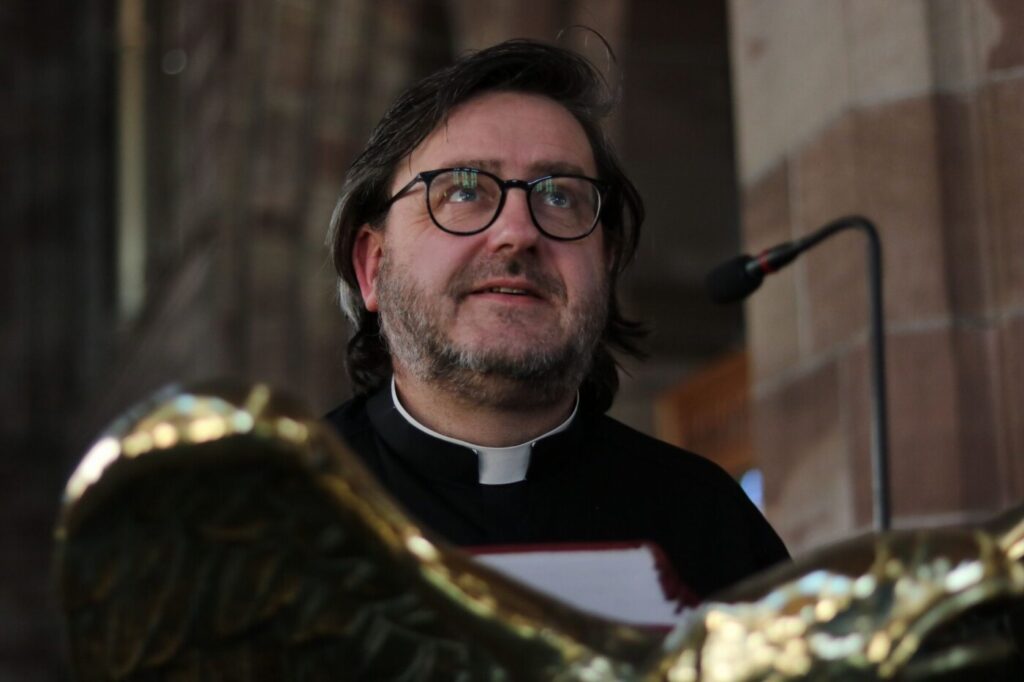
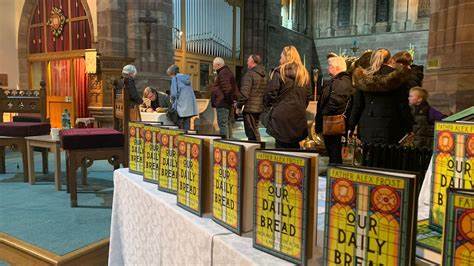

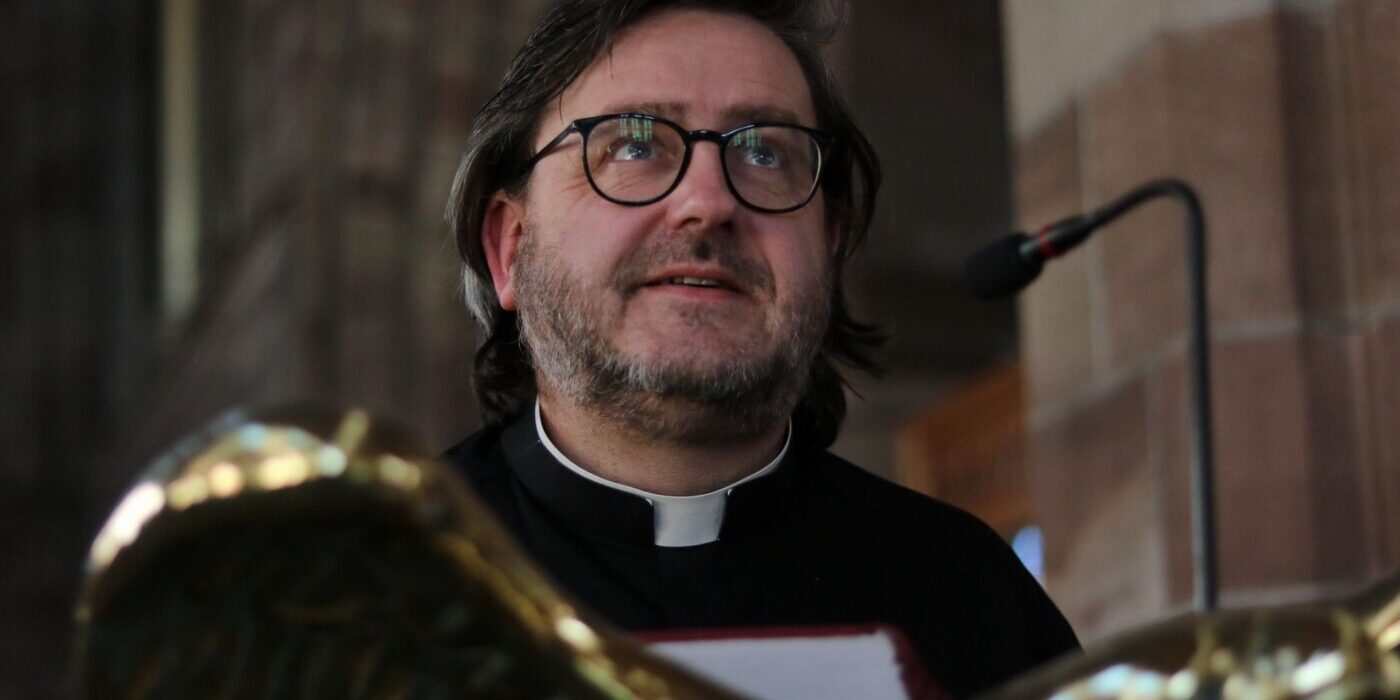
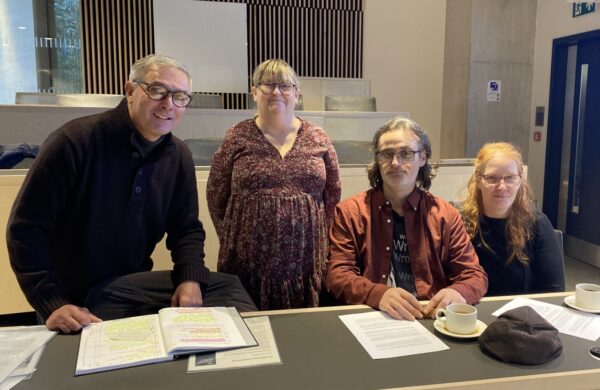

 Niall Cooper outlines the new Let’s End Poverty campaign, and how you can get involved.
Niall Cooper outlines the new Let’s End Poverty campaign, and how you can get involved.